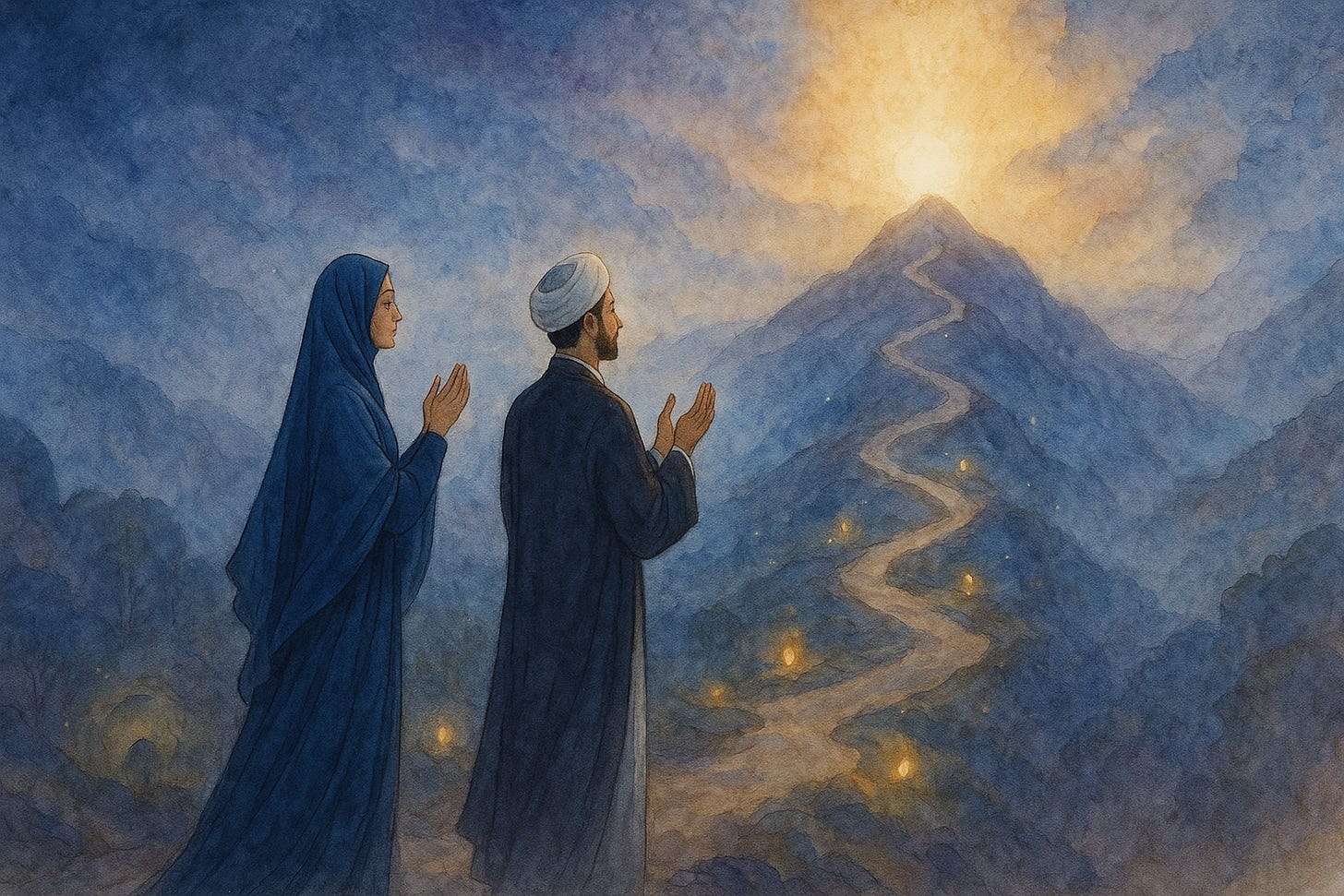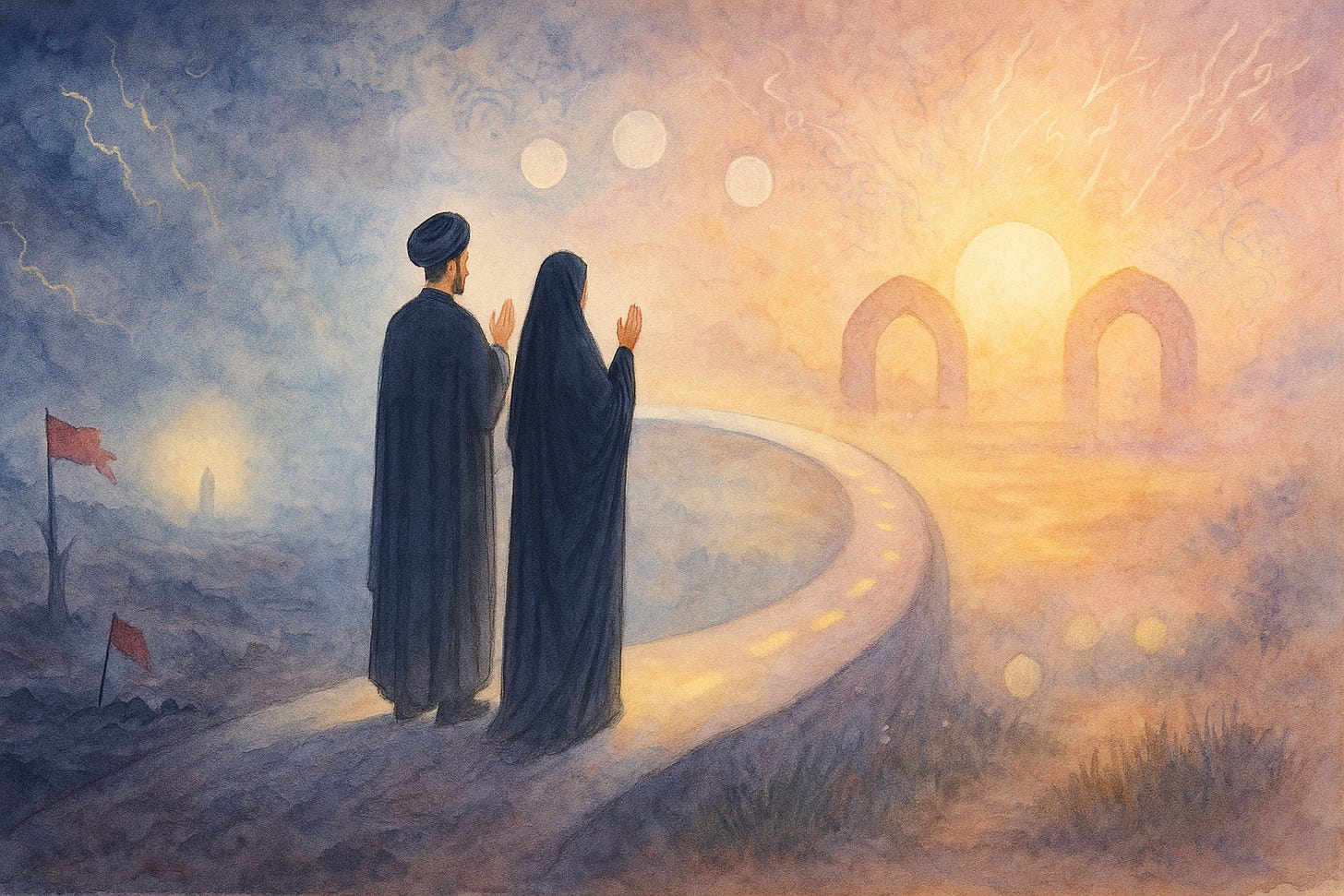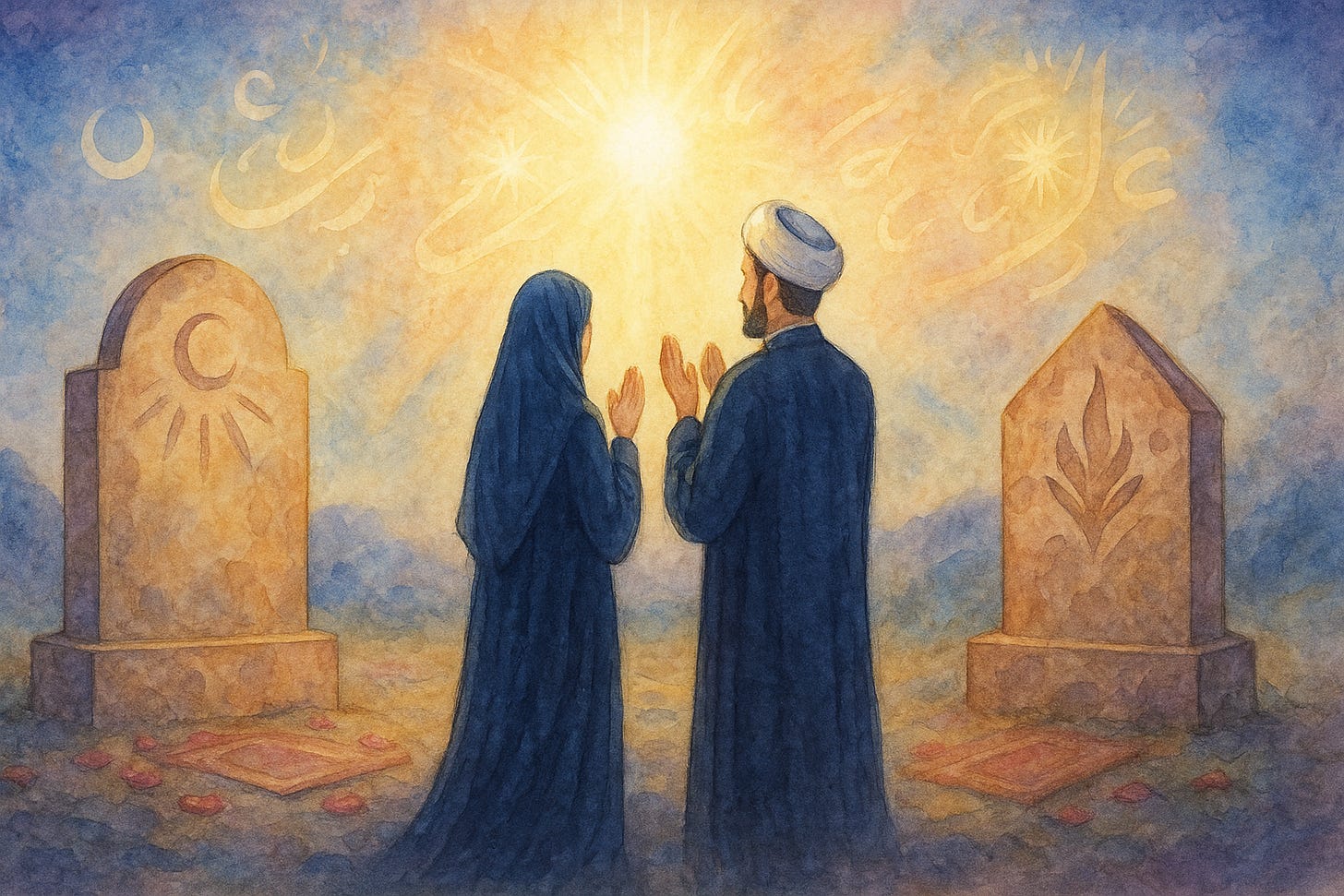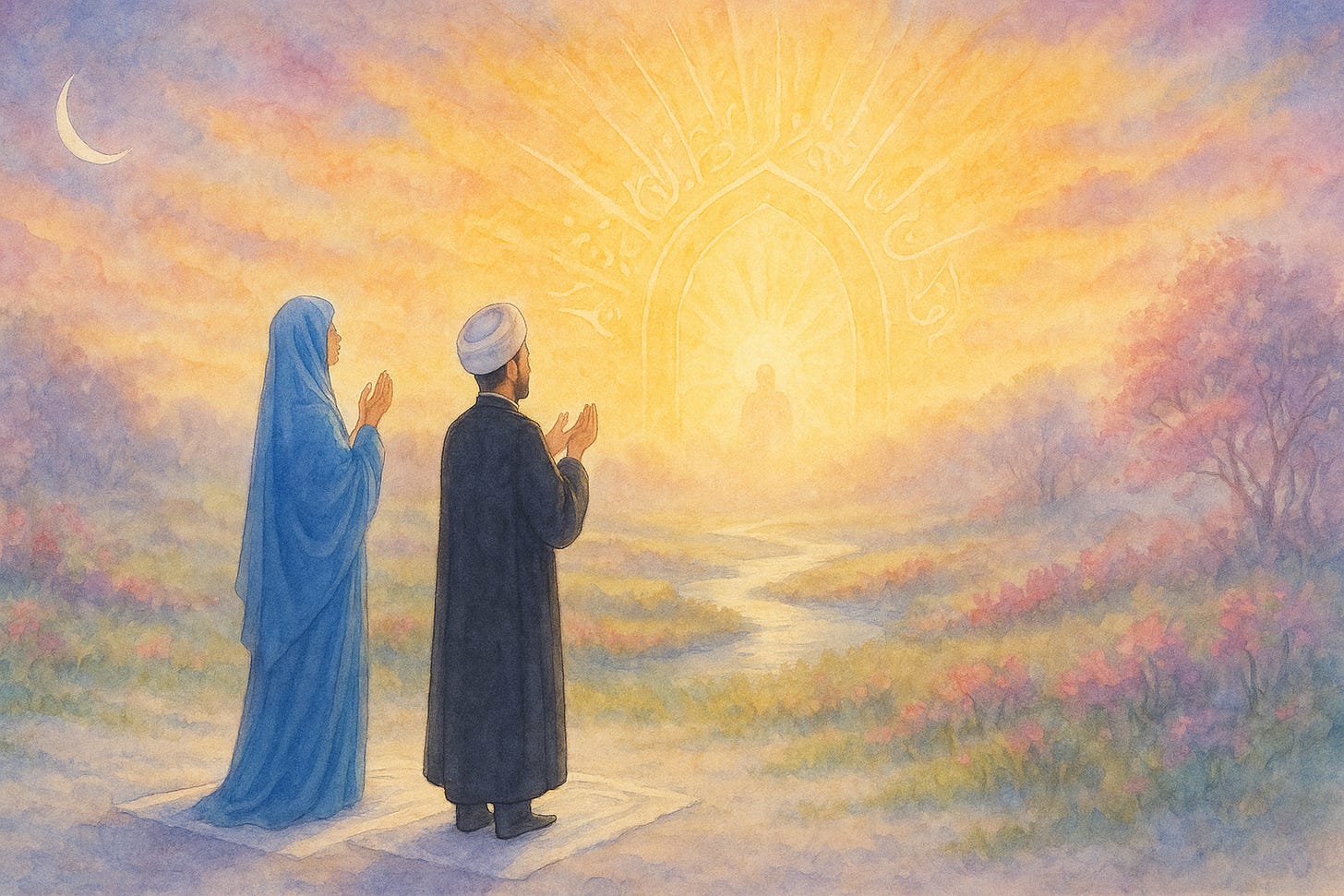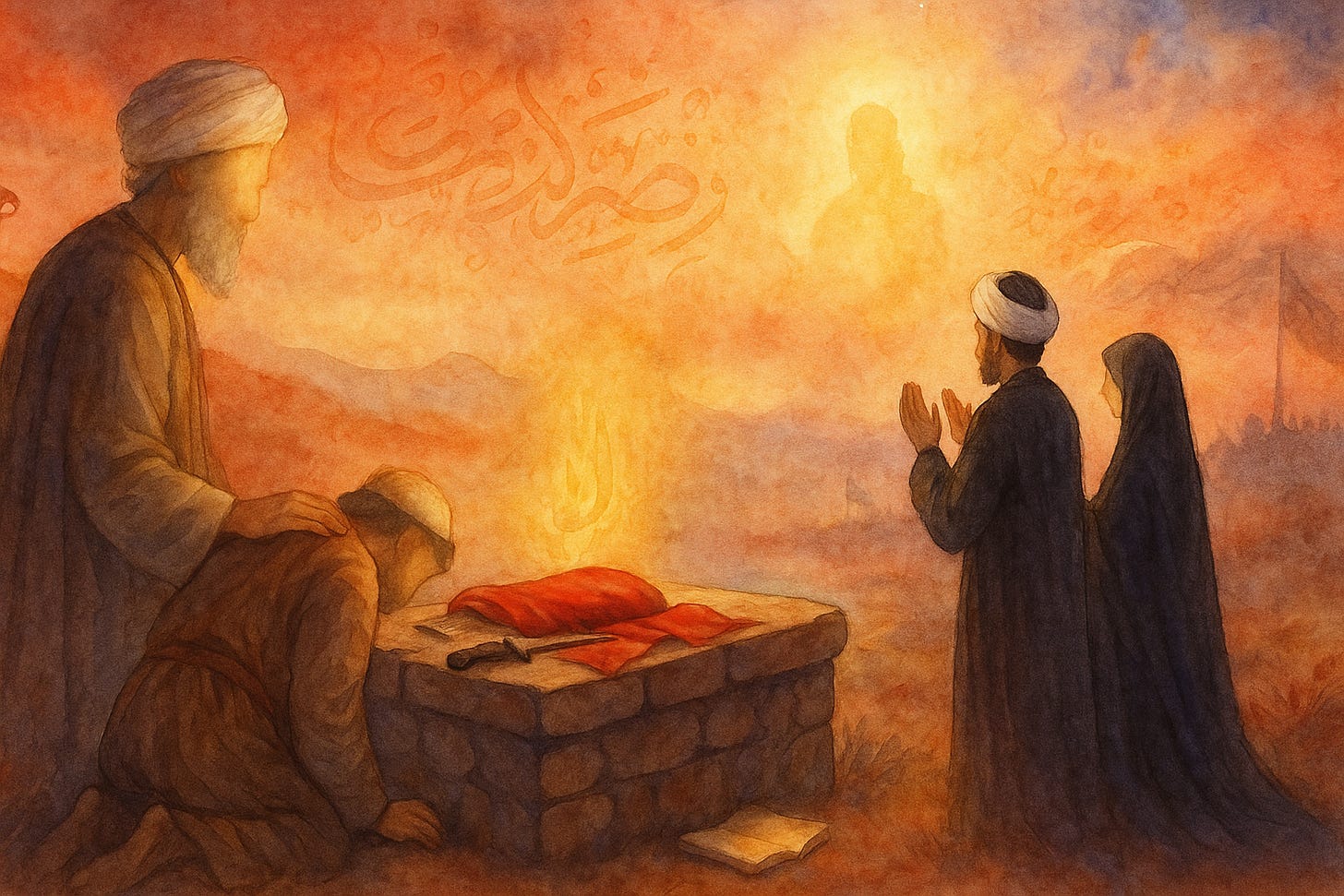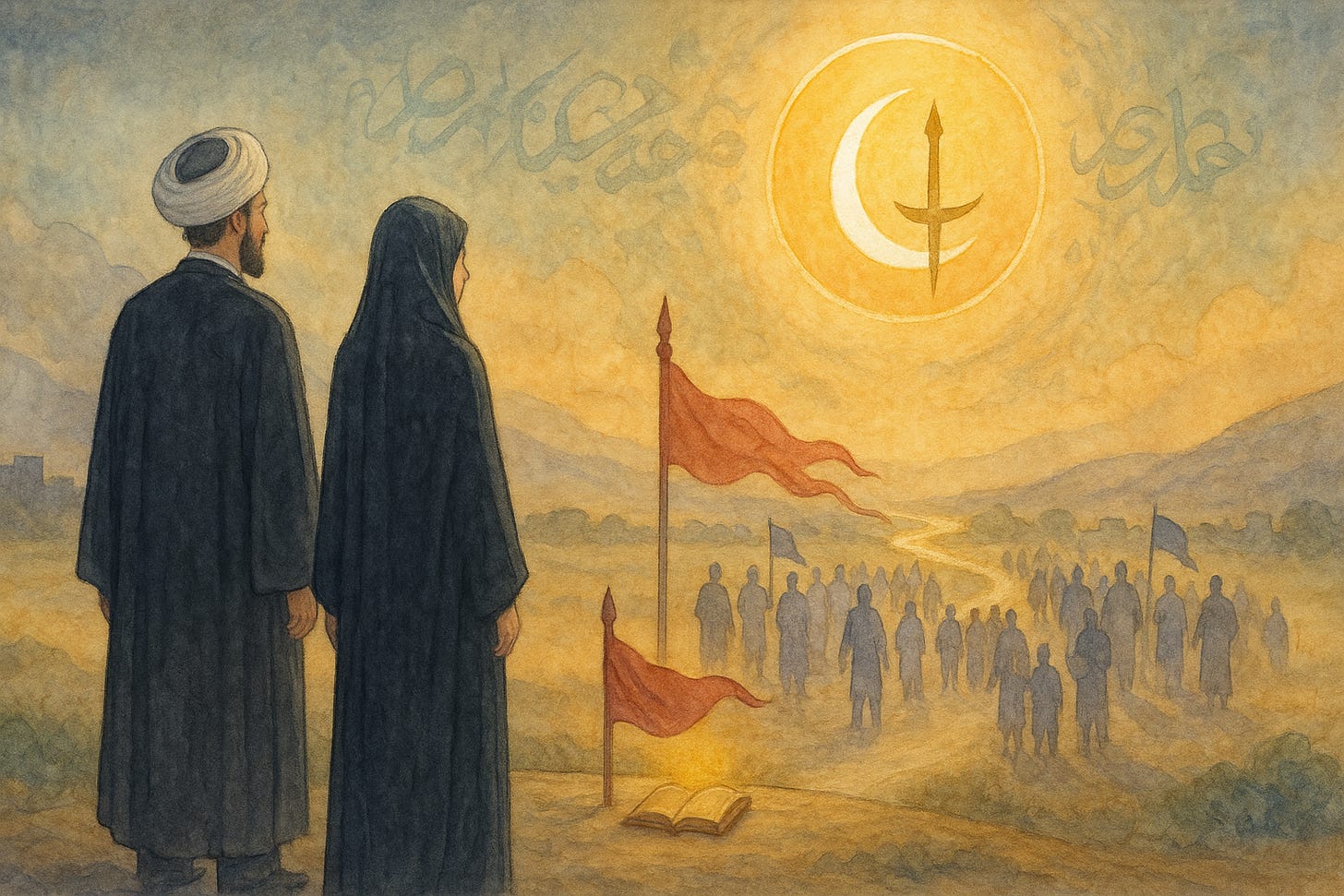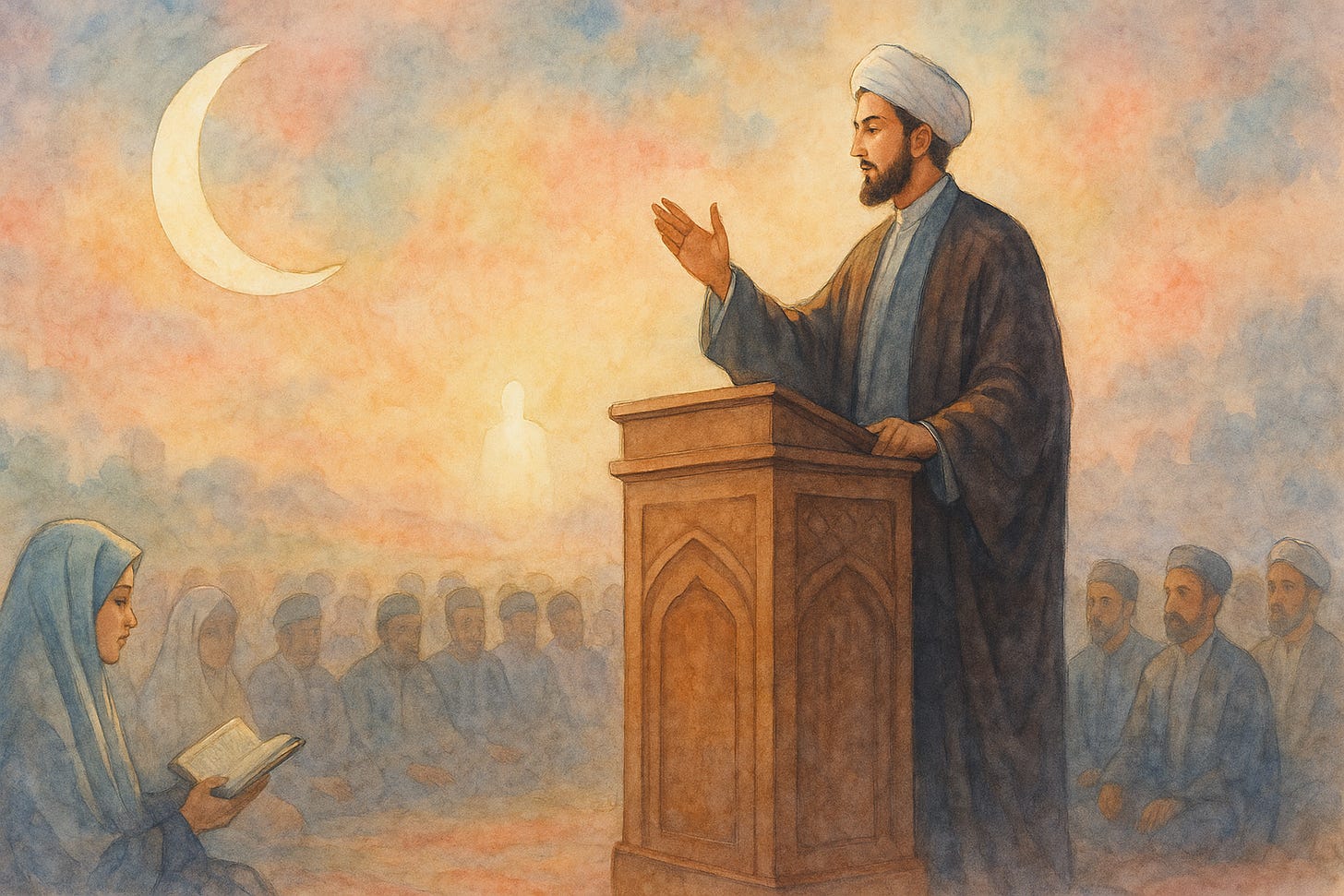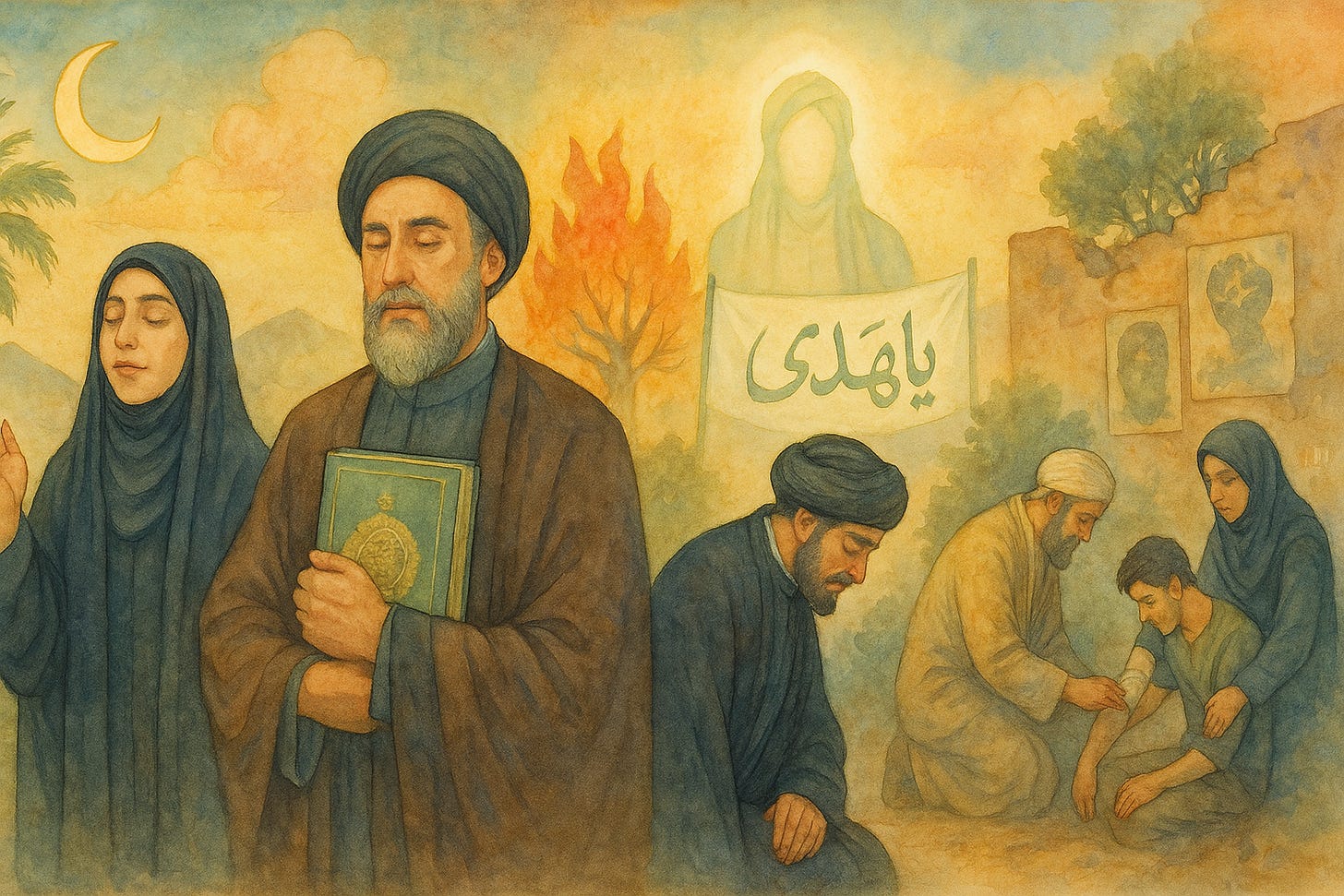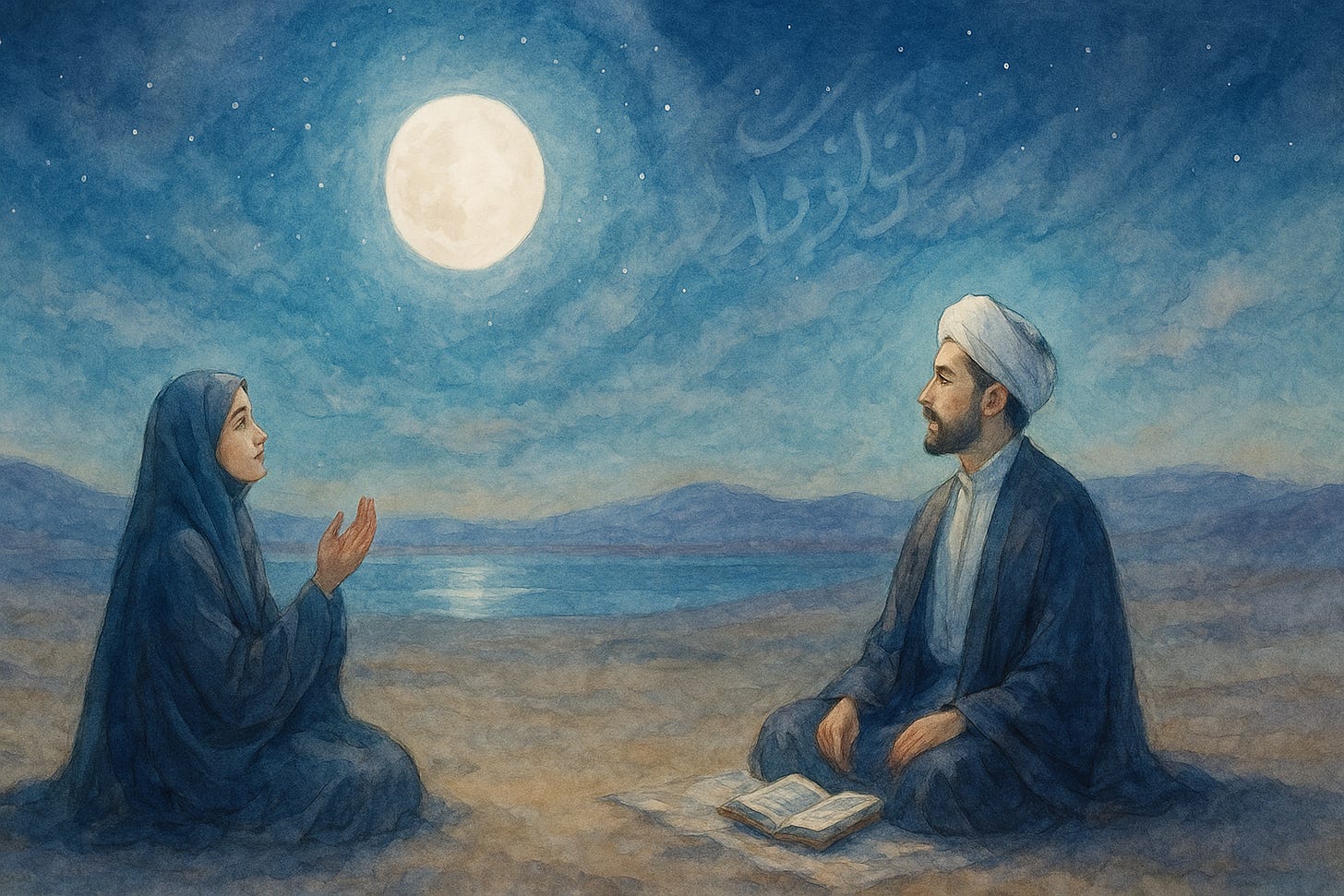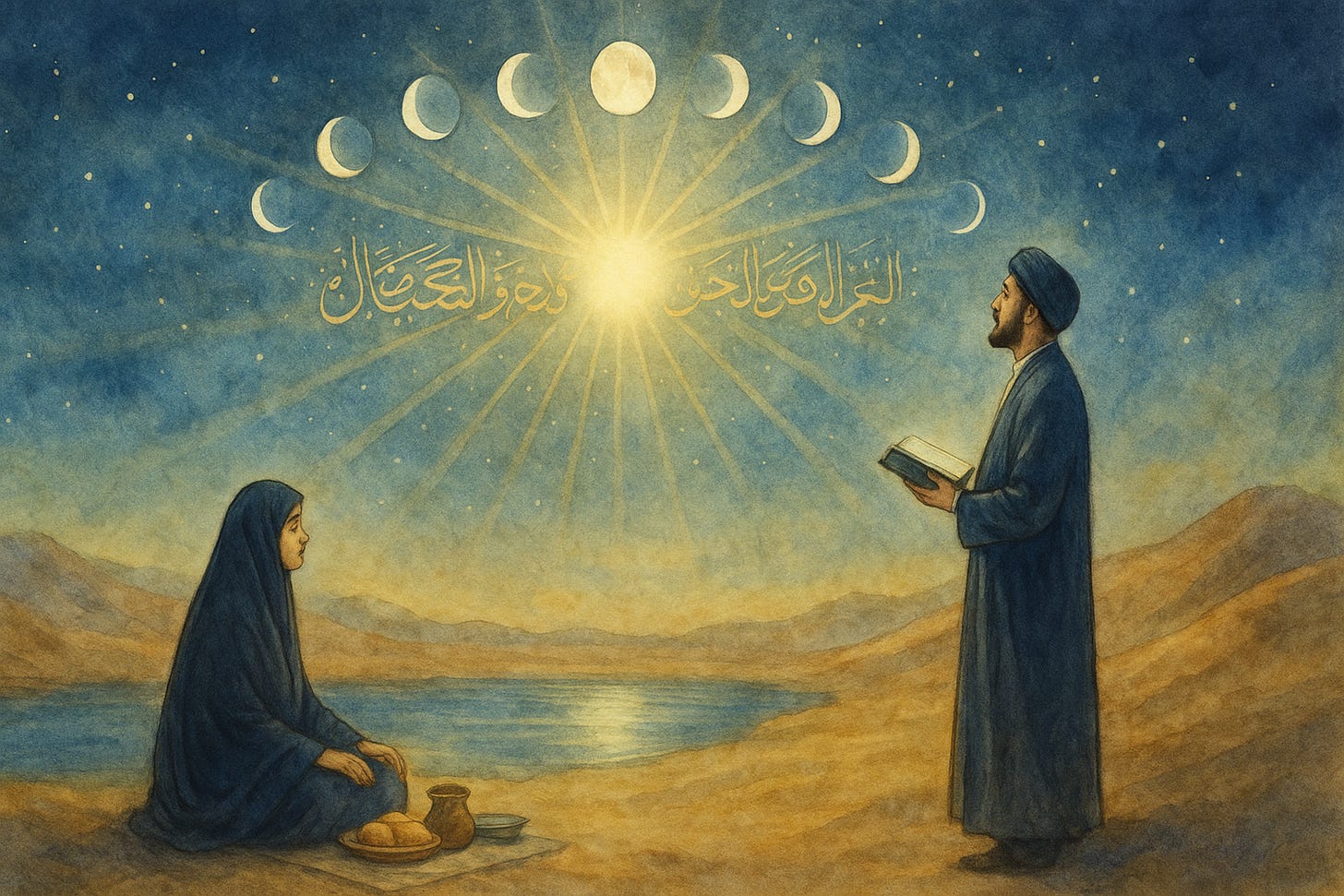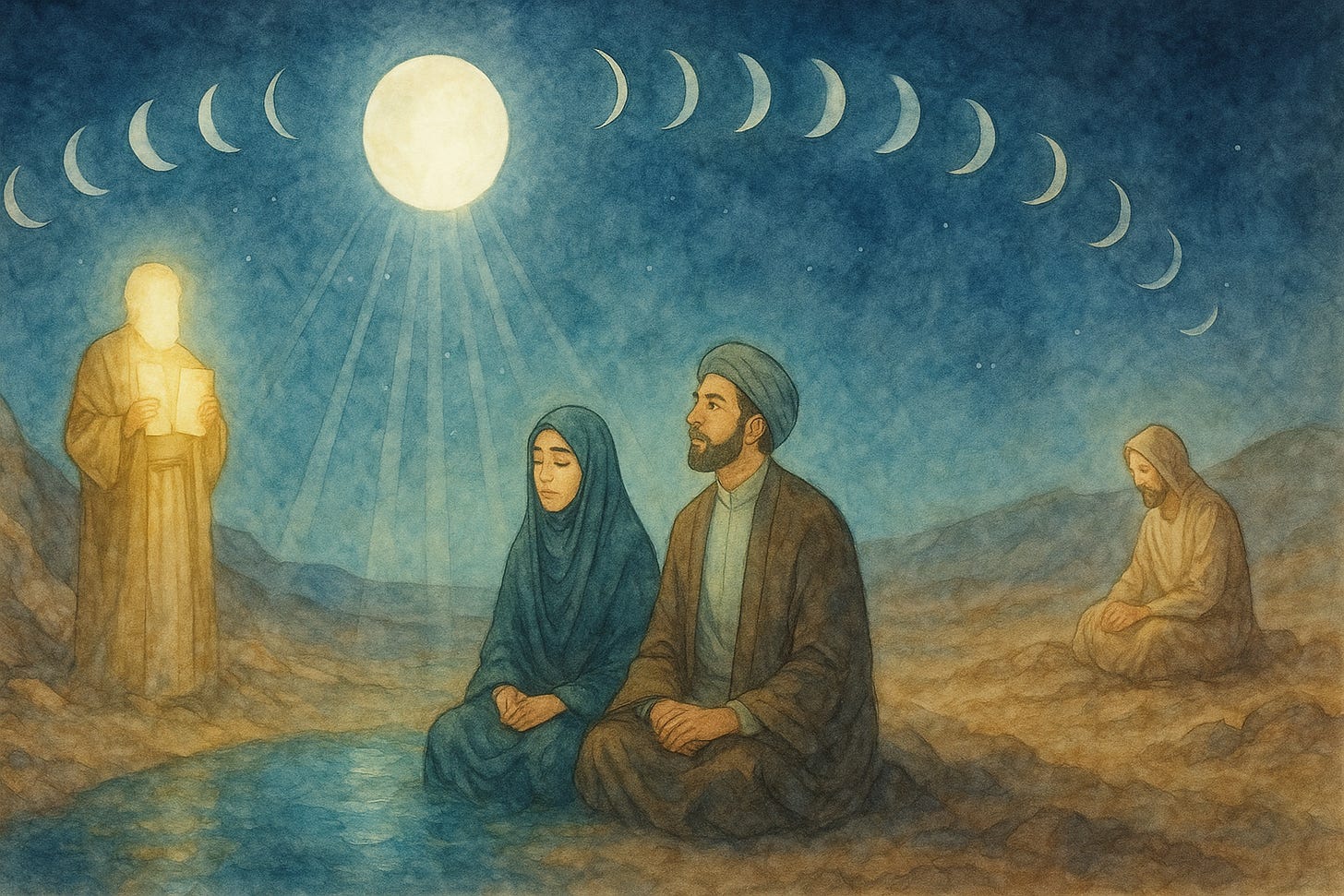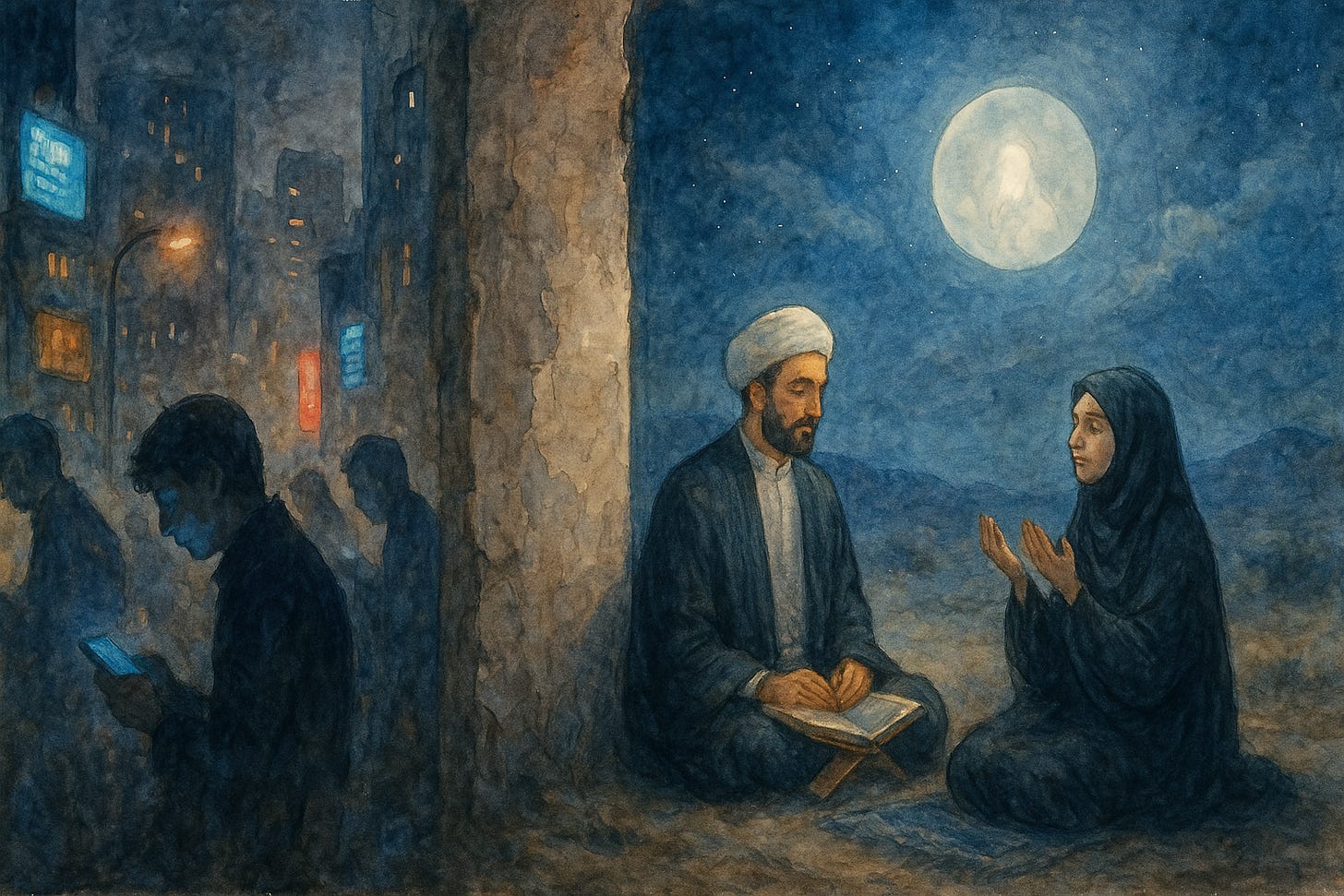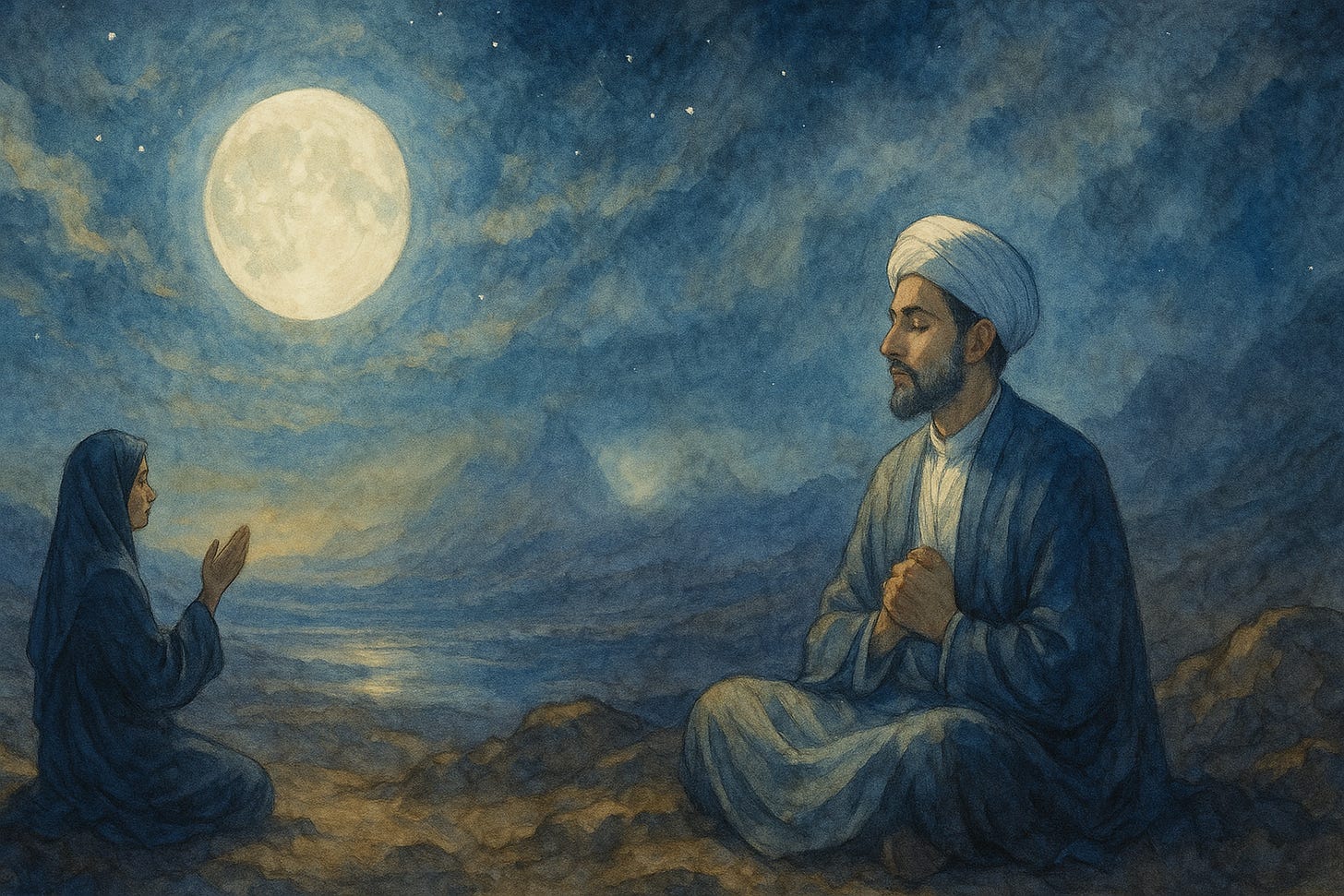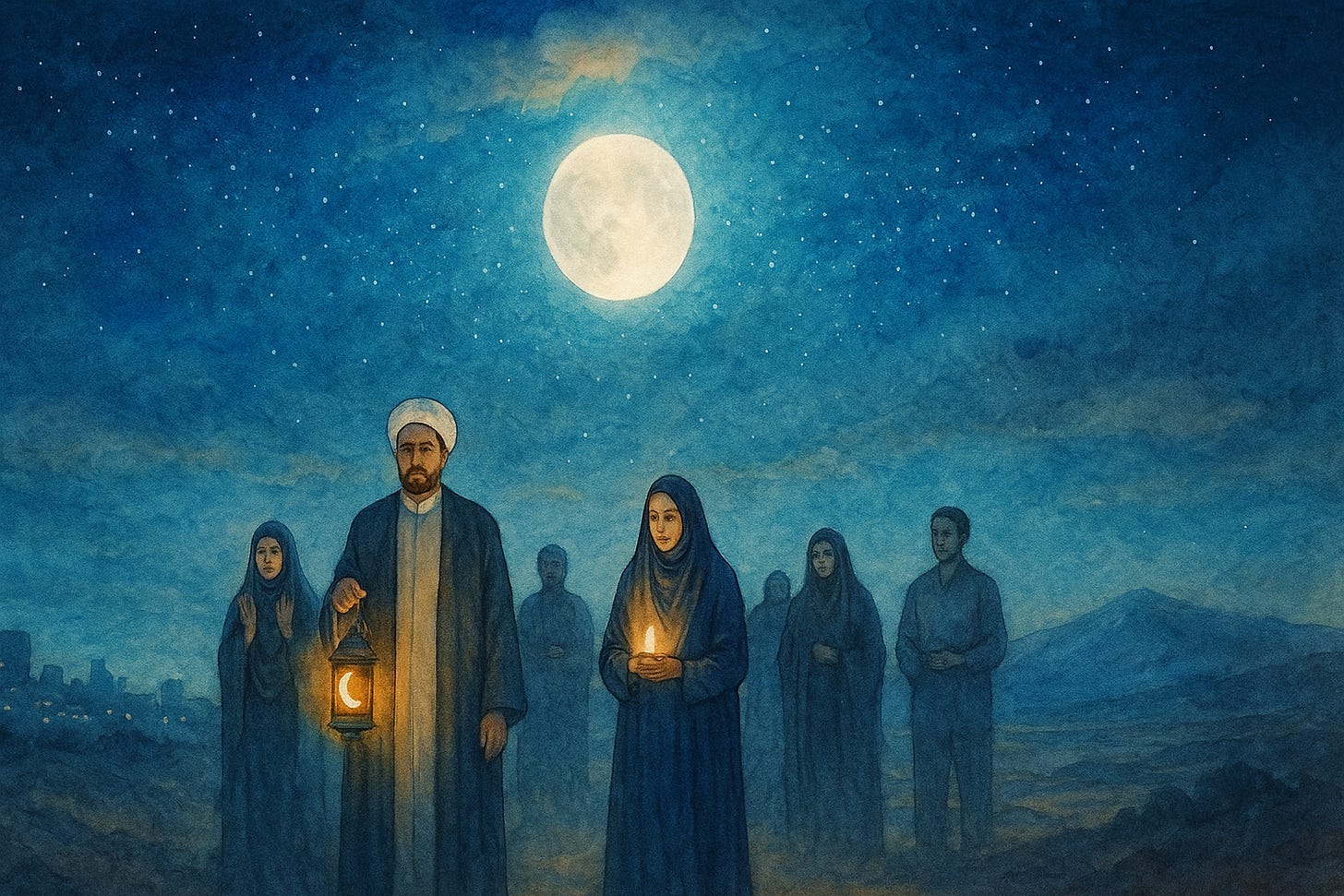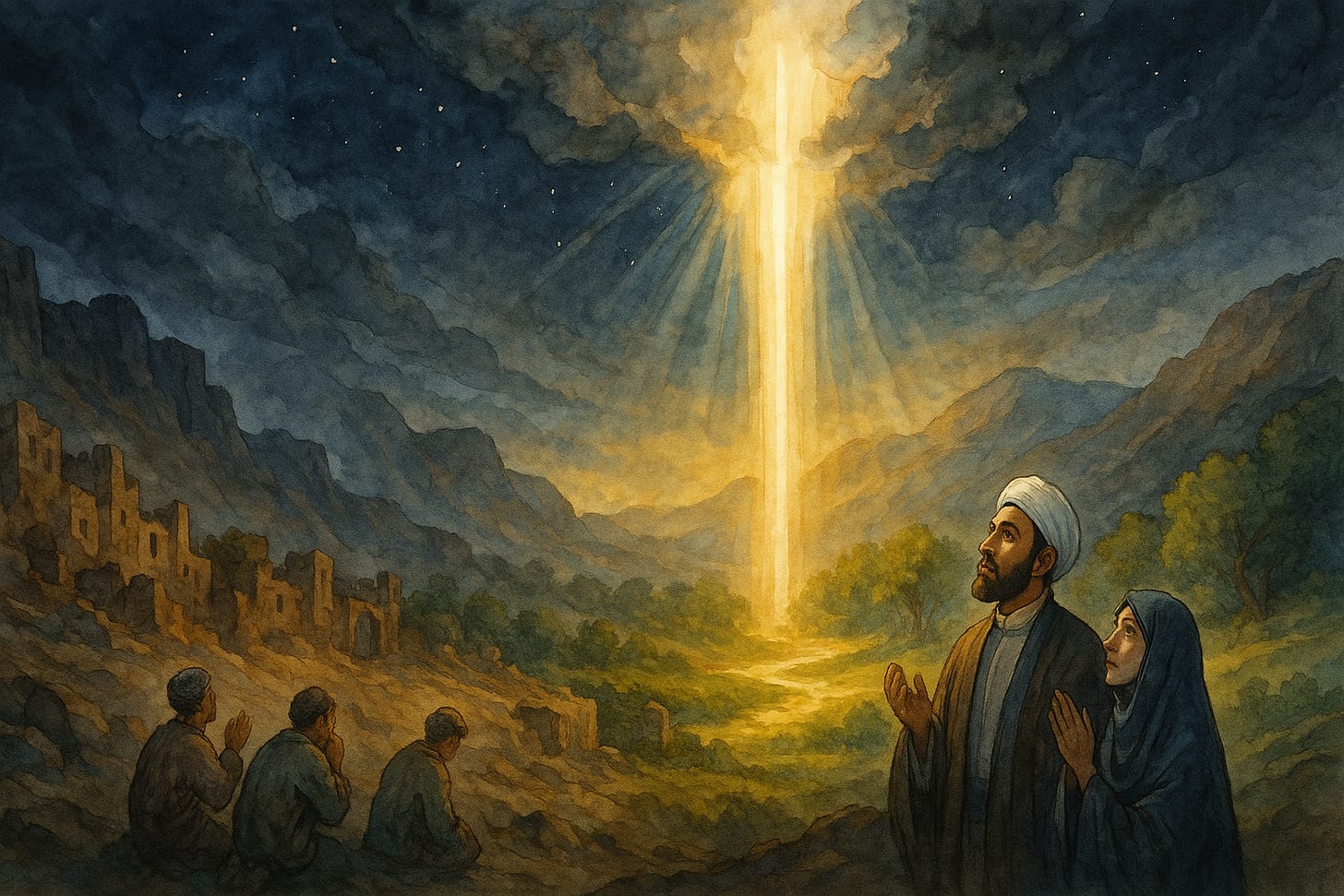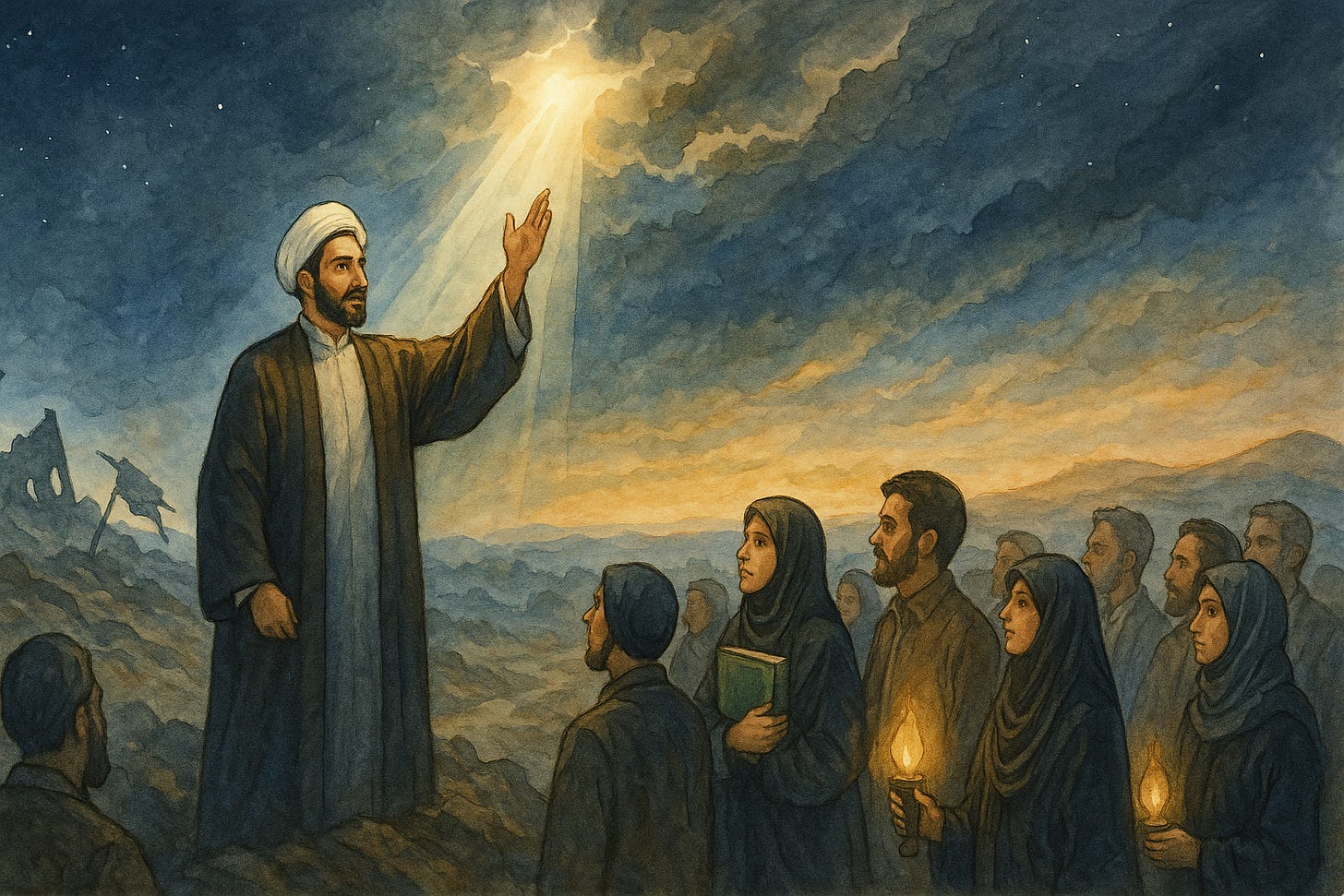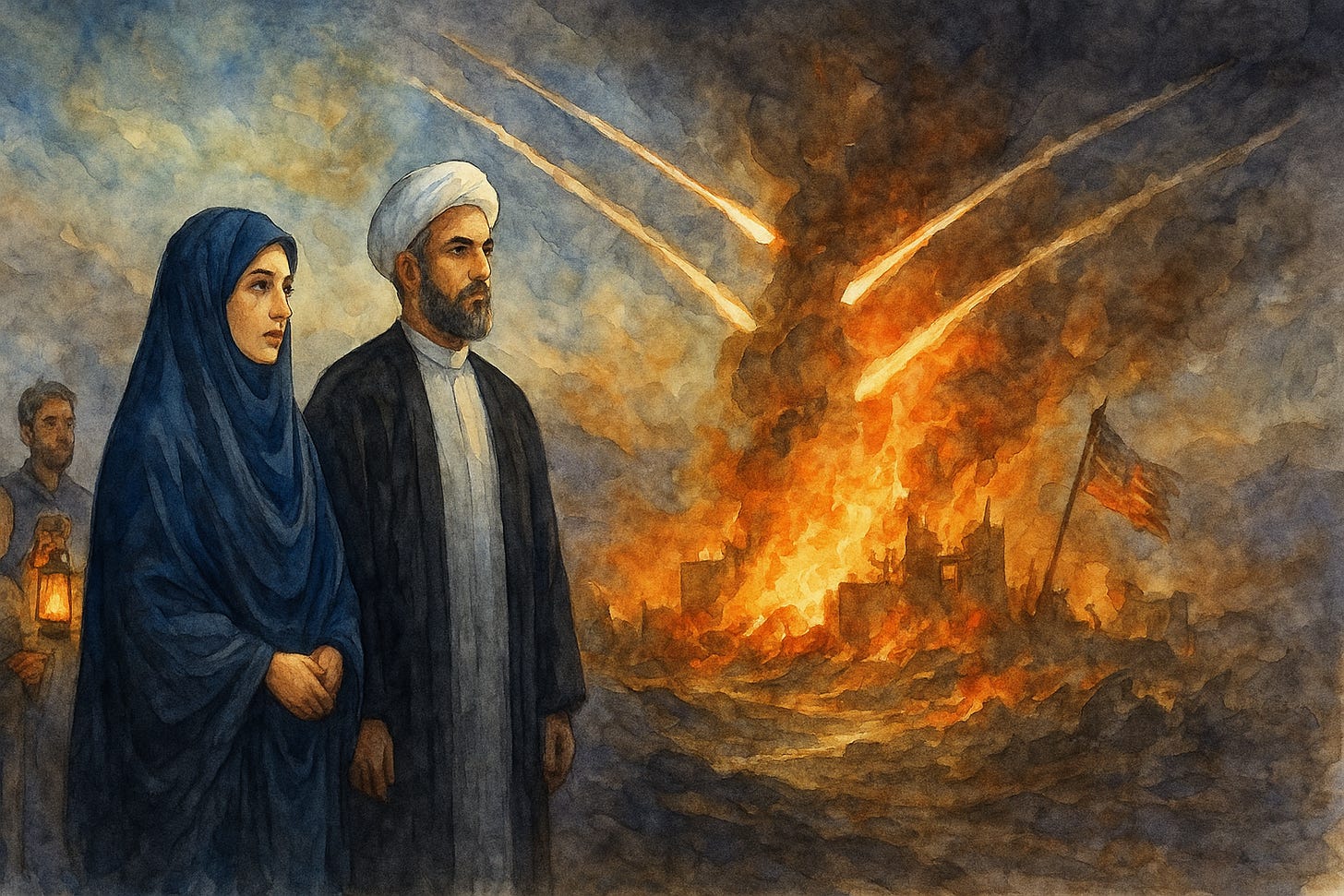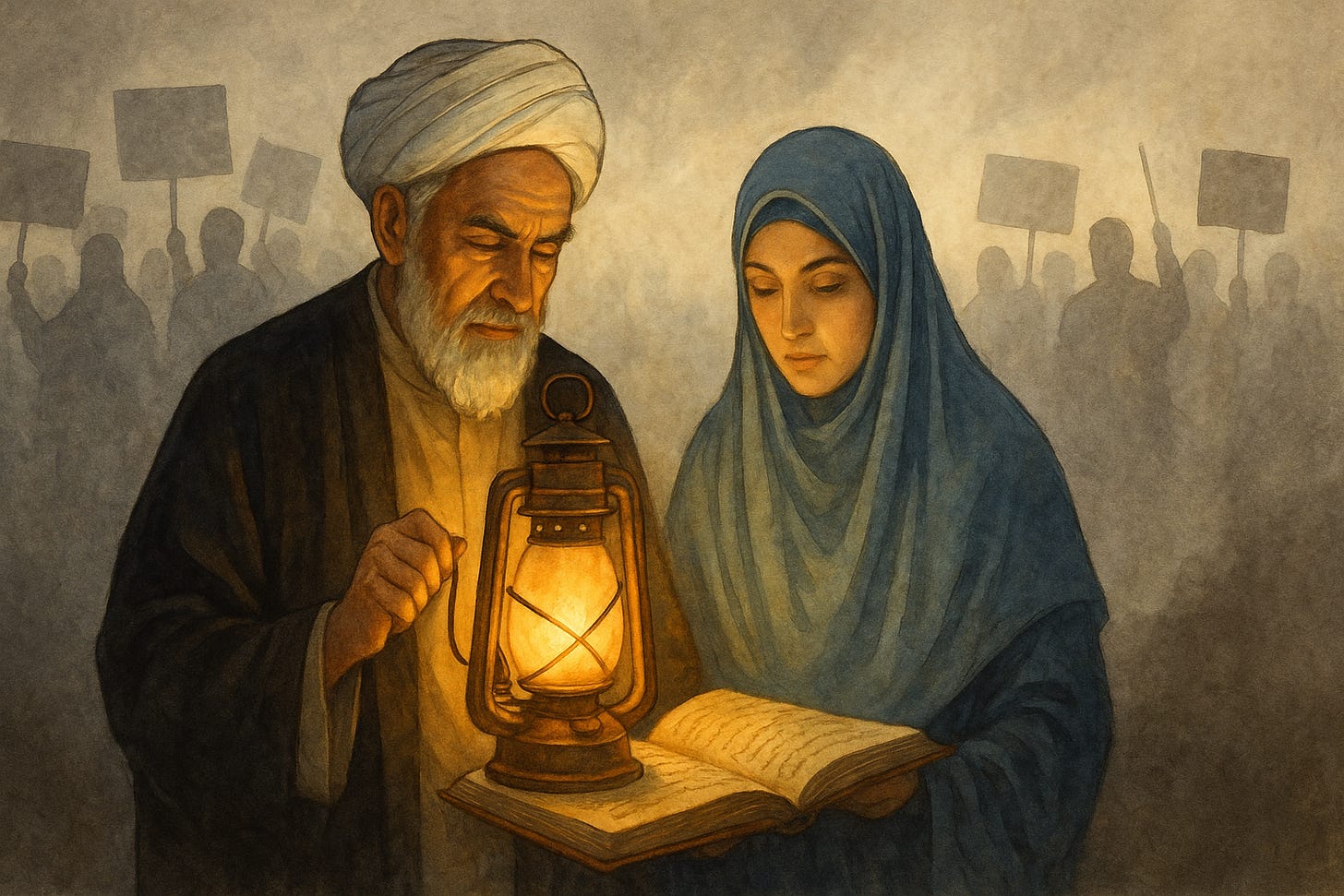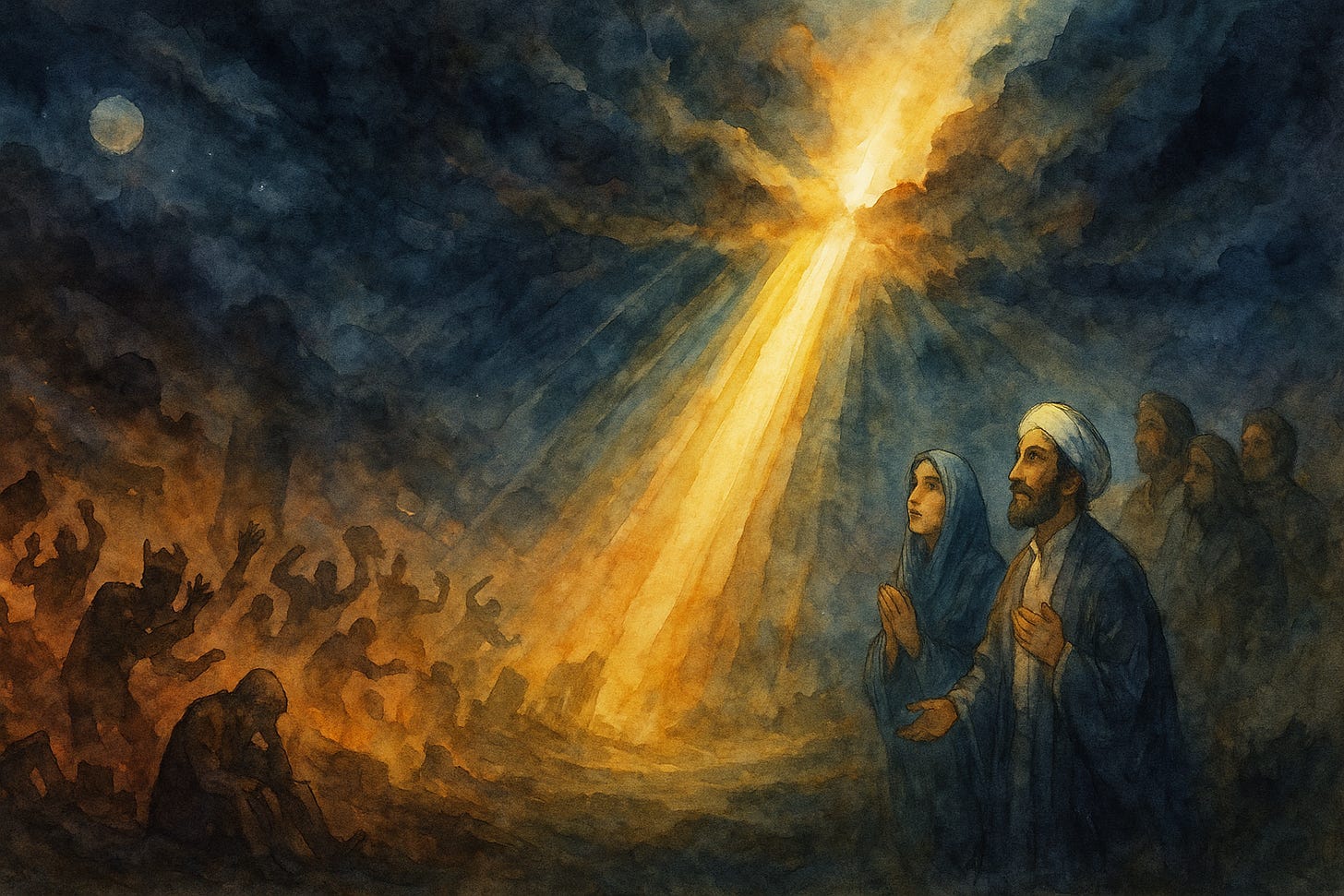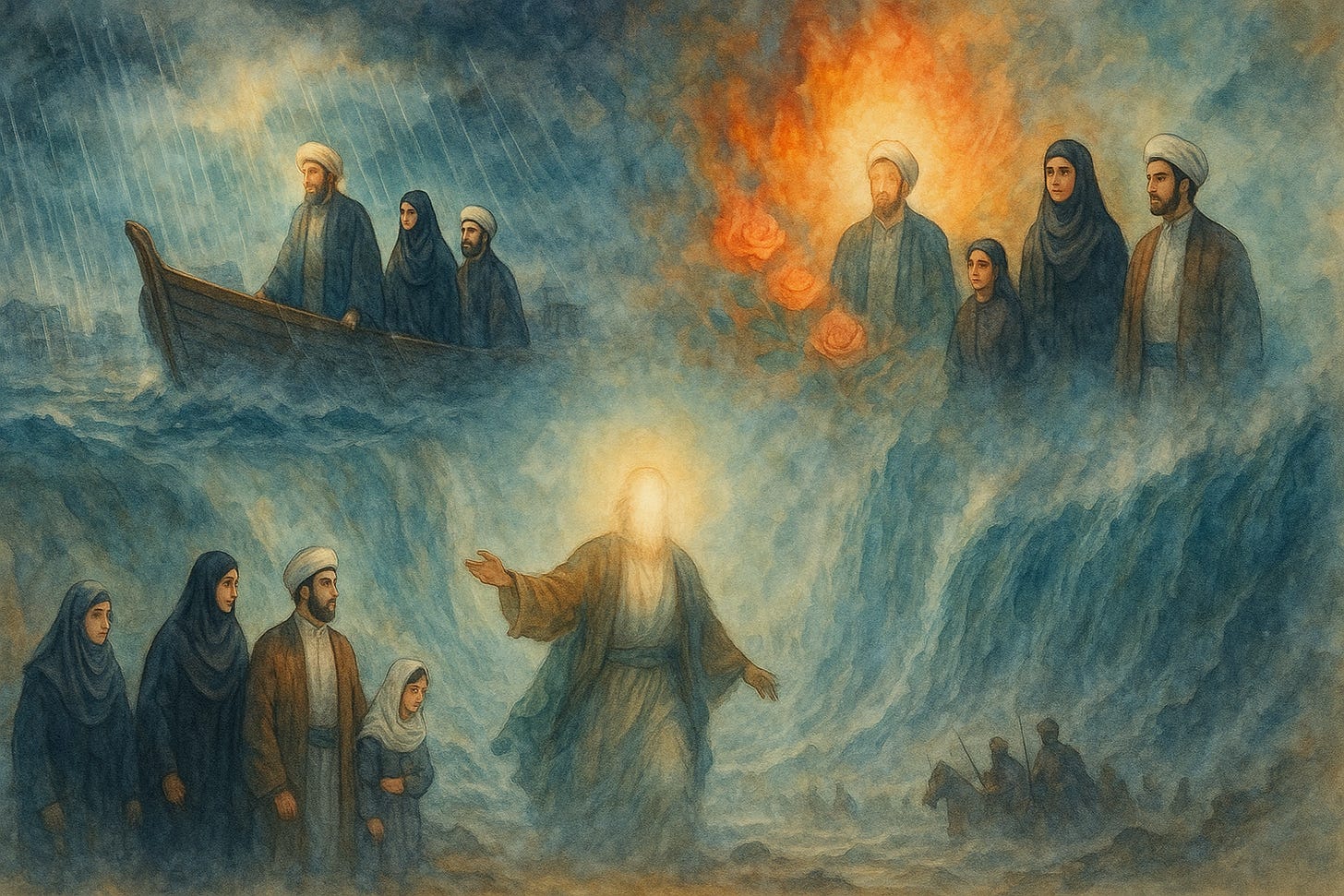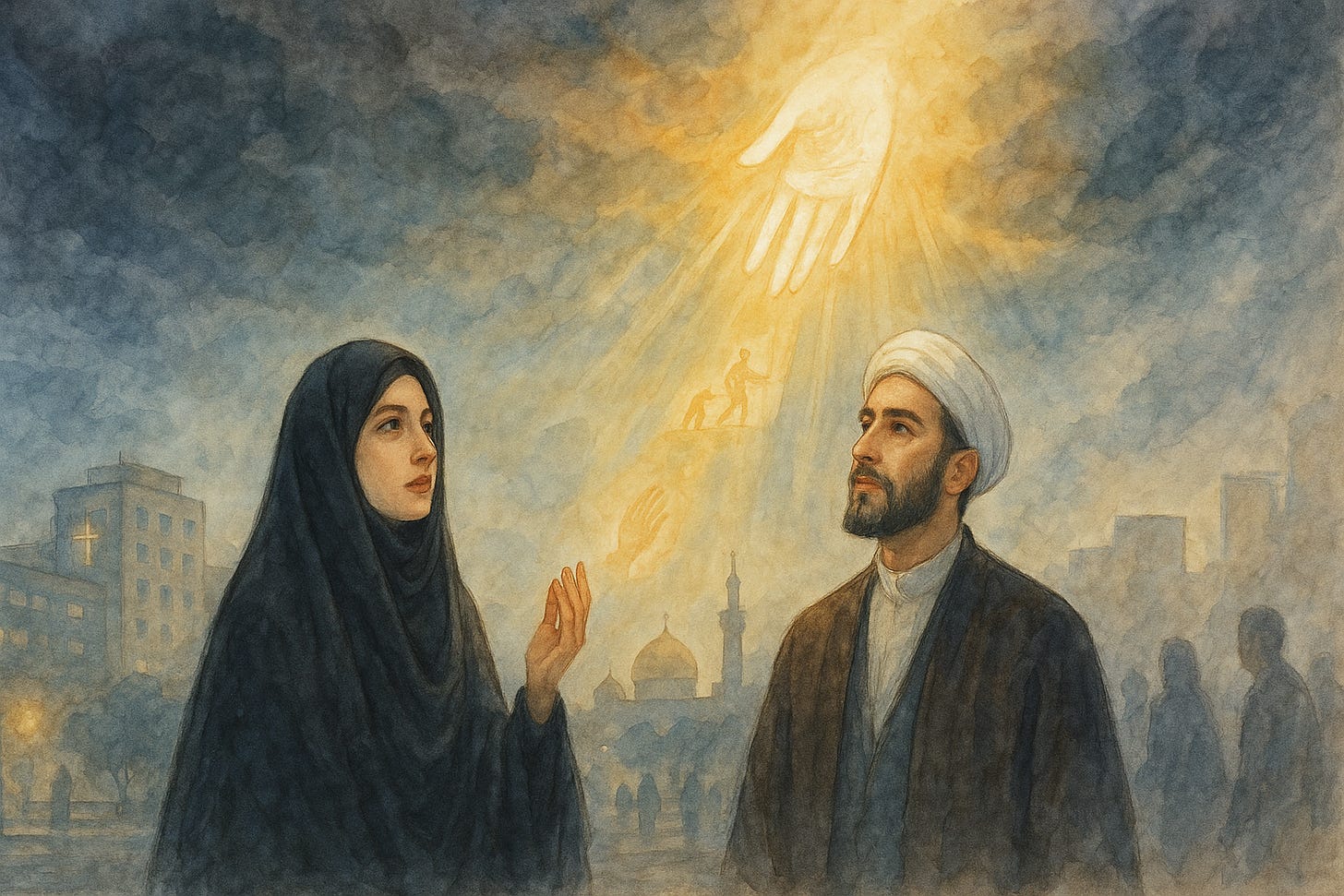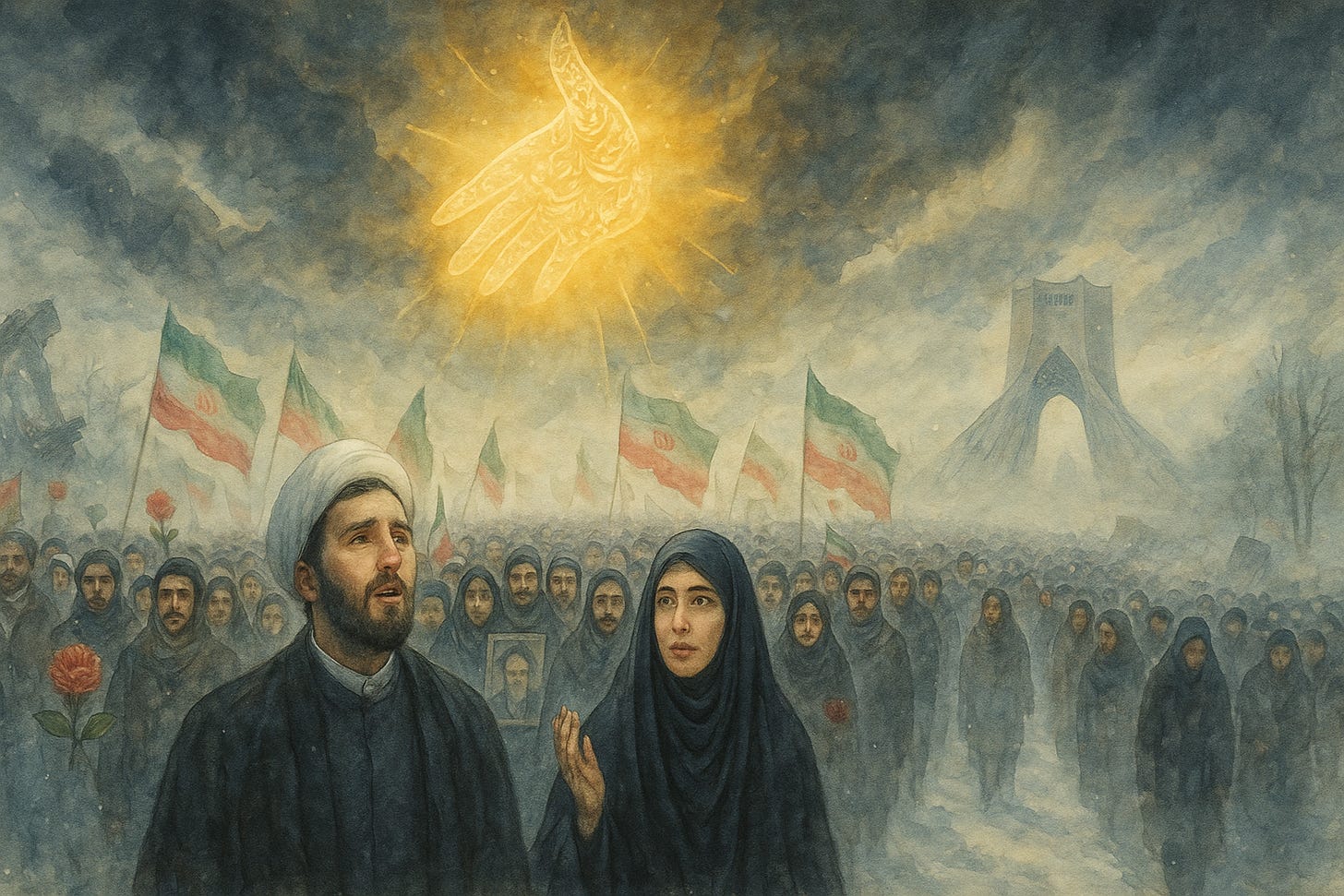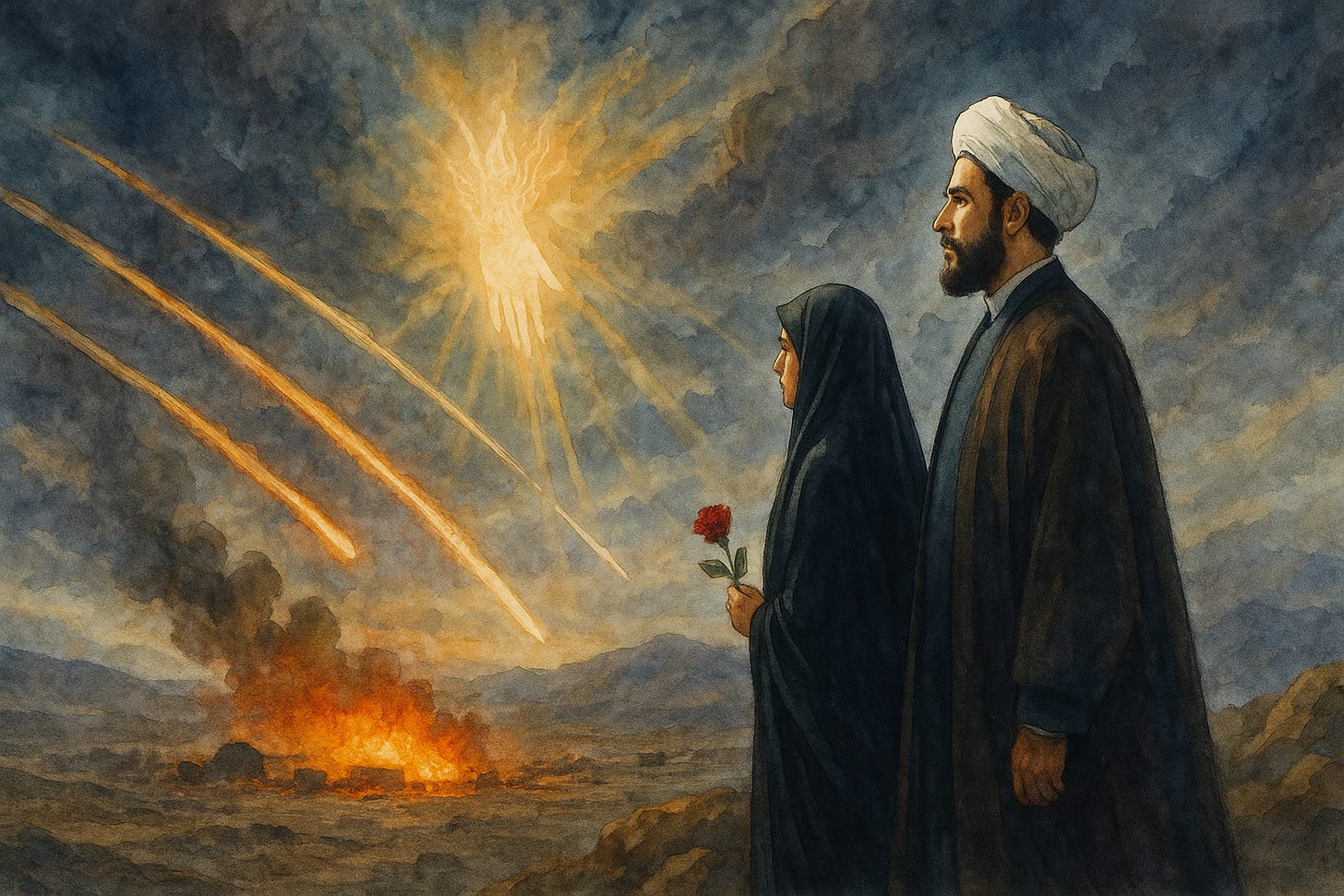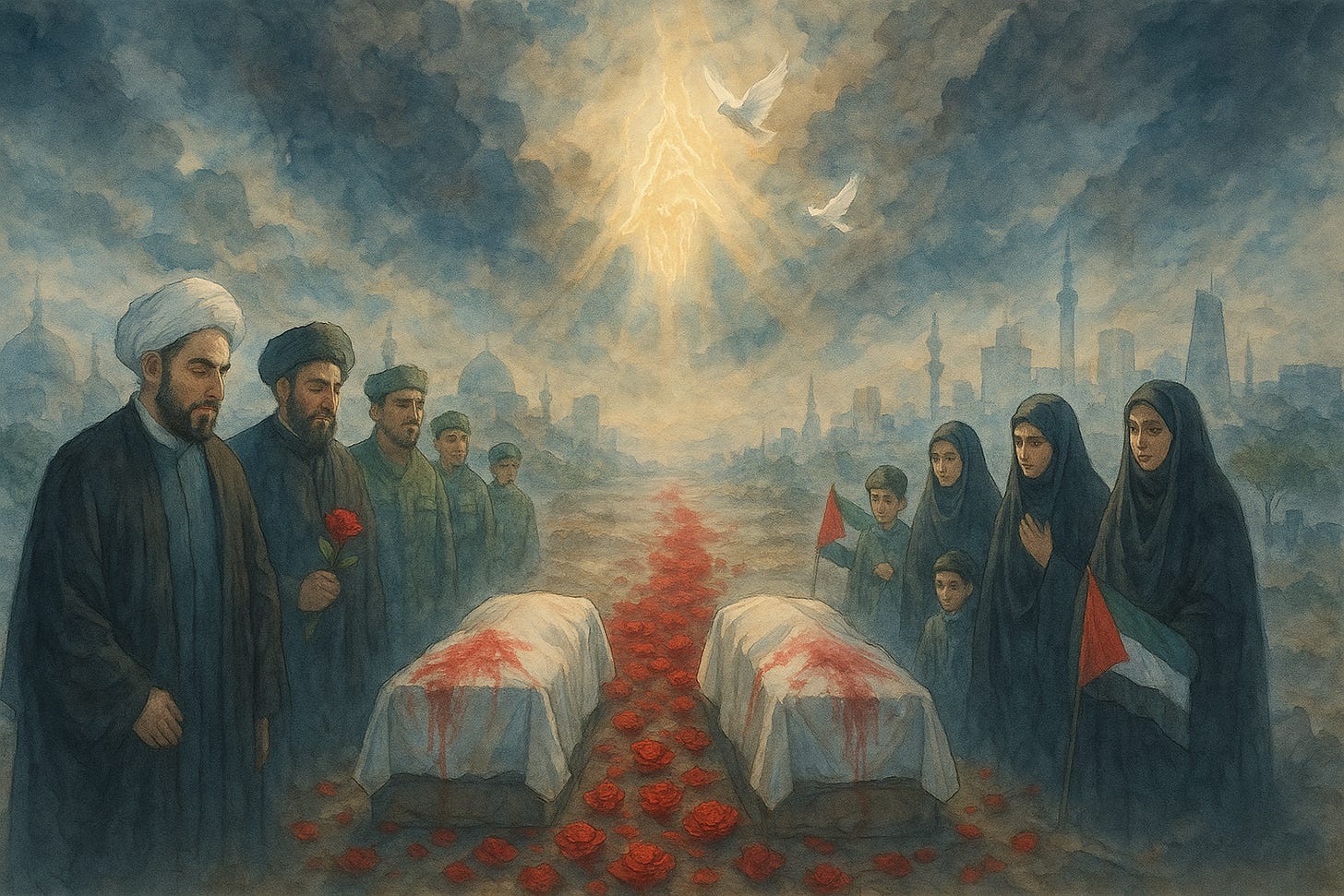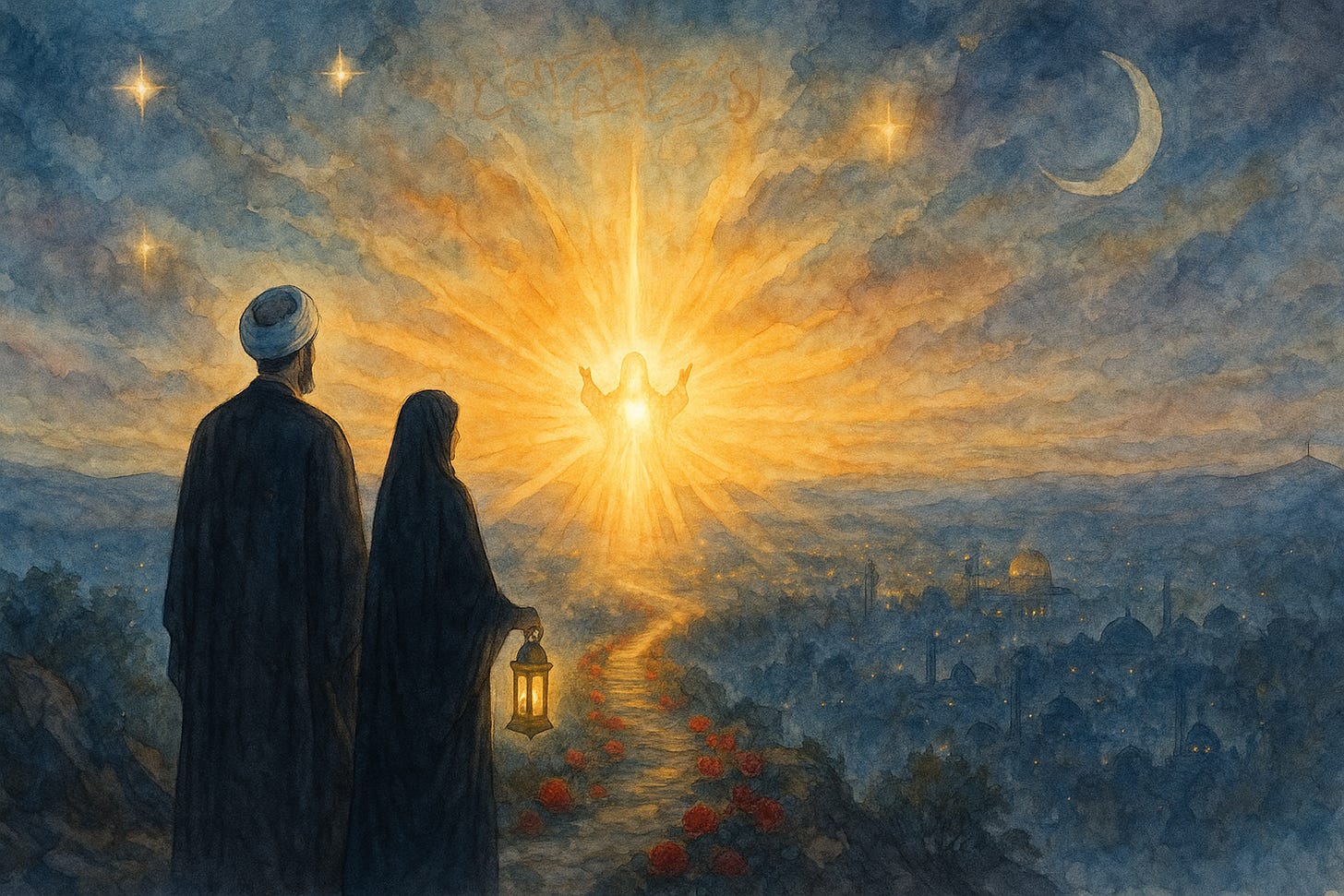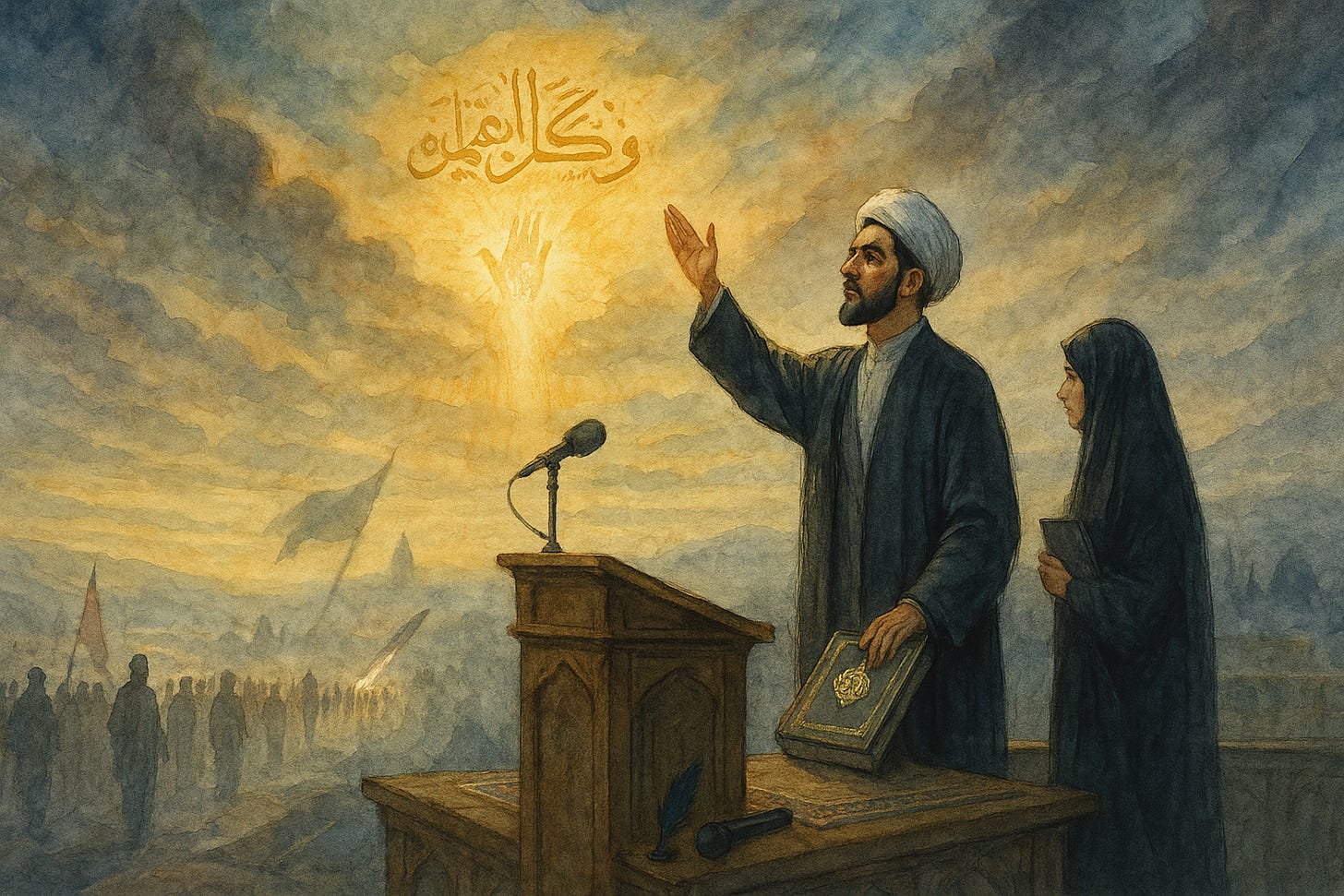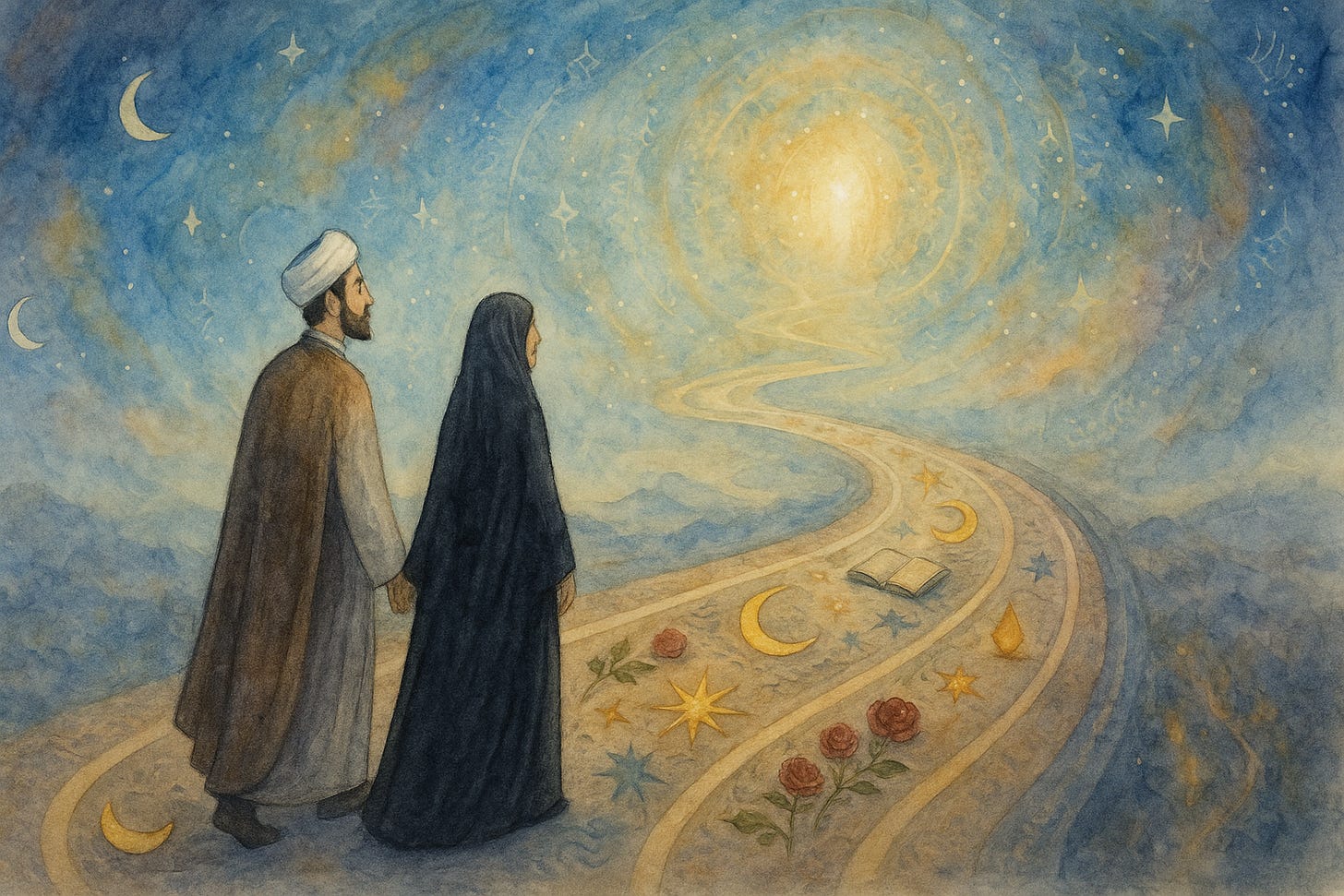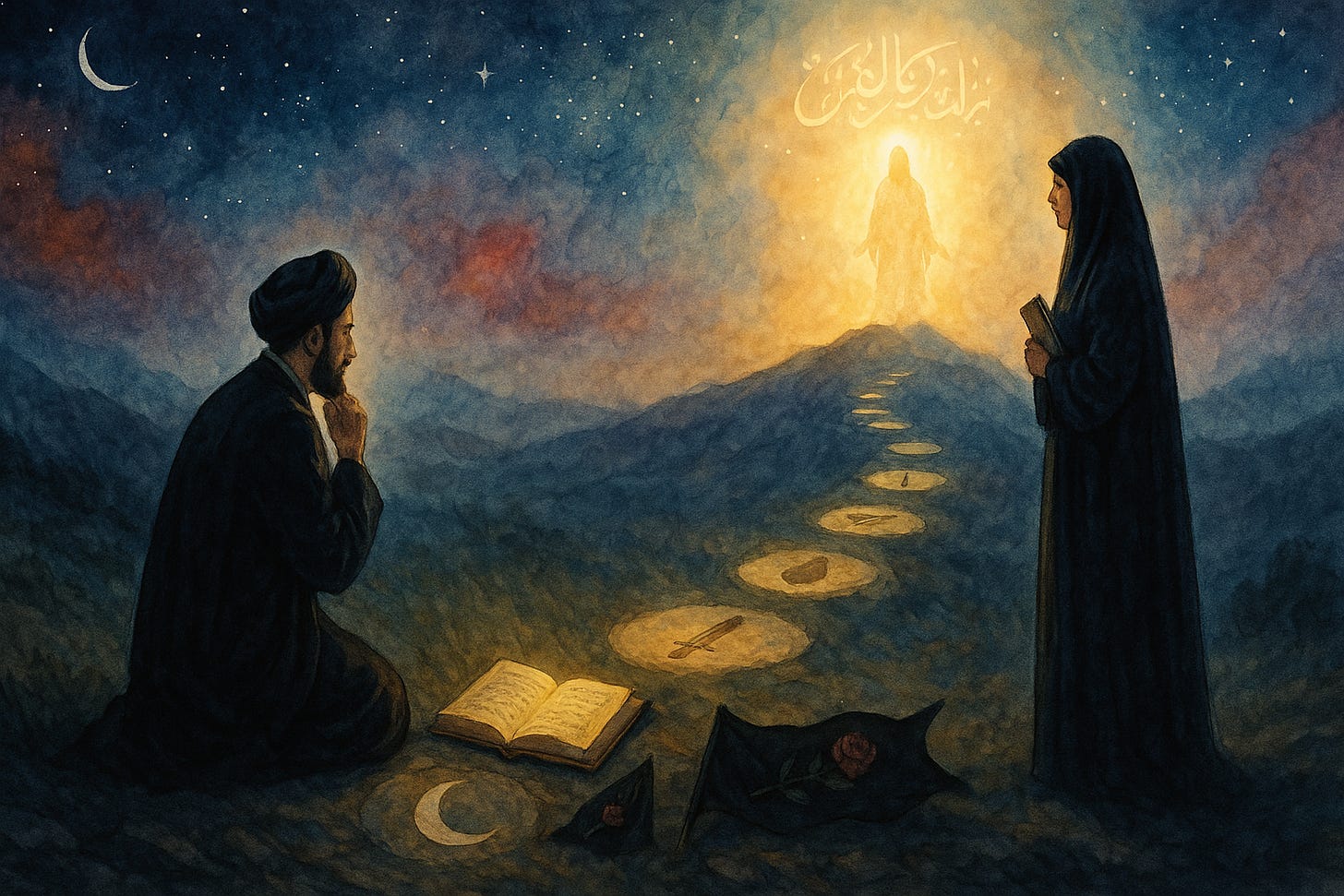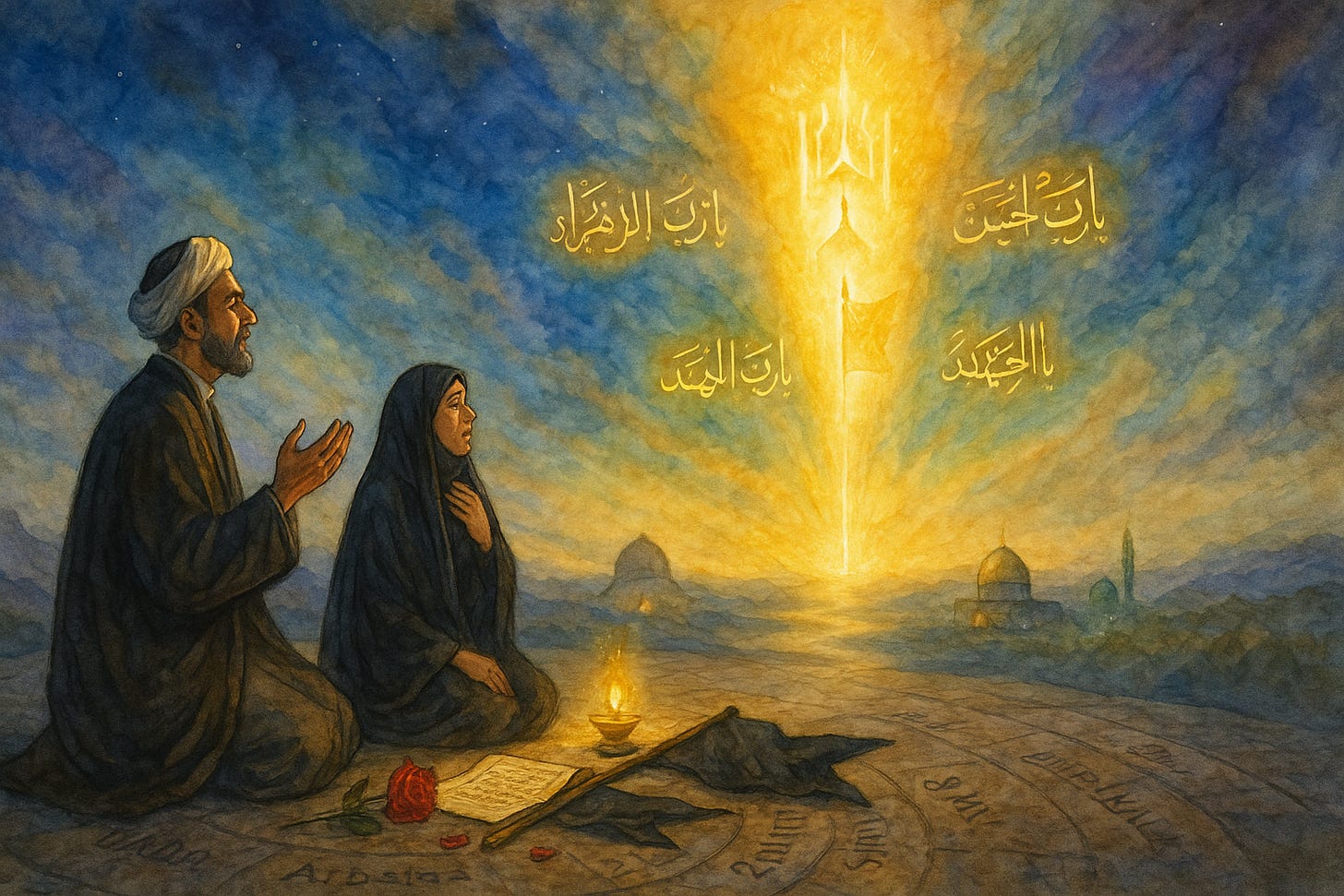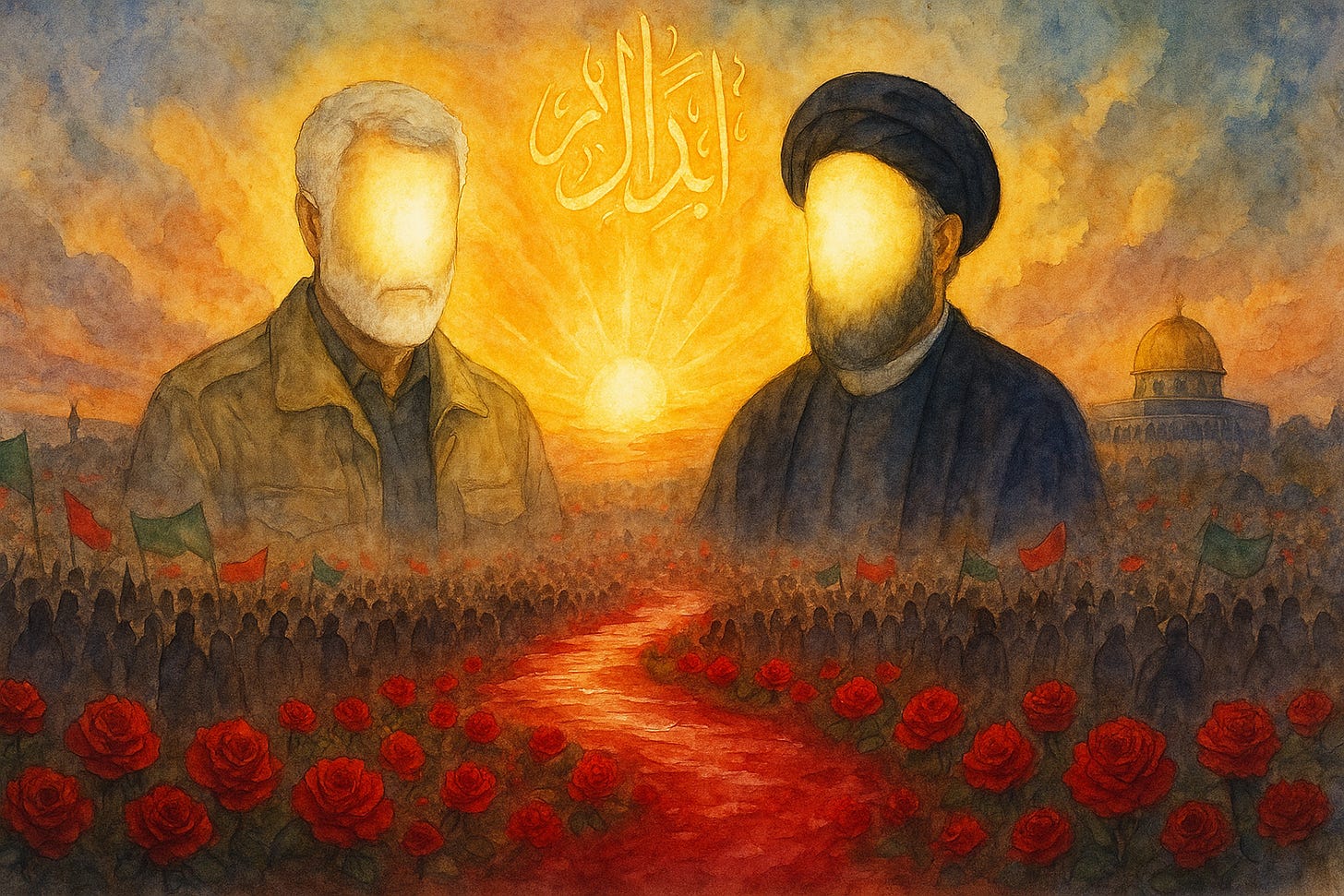[15] The Art of Supplication - The Sacred Windows: The Role of Time - Part 2: The Yearly Rhythm of Mercy - Part 4: The Completion of Mercy
A series of discussions based on the book Uddat al-Dai wa Najah as-Saee - The Provision of the Supplicant, and the Triumph of the Seeker by Ibn Fahd al-Hilli on the subject of Supplication and Prayer.
In His Name, the Most High
This is the fifteenth part of our series, The Art of Supplication, an ongoing exploration into the sacred relationship between the supplicant, the supplication, and the Divine.
The insights within this series are cumulative, and the nature of our discussion requires that each part build upon foundations laid in the ones that came before.
To prevent any misunderstanding and to fully benefit from the depth of this subject, it is essential that you engage with the previous parts in order before continuing with this one.
The previous parts in this series can be found here:
Video of the Majlis (Sermon/Lecture)
This write up is a companion to the video majlis (sermon/lecture) found below:
Audio of the Majlis (Sermon/Lecture)
This write up is a companion to the audio majlis (sermon/lecture) found below:
Recap
The Yearly Rhythm of Mercy – Part 3: The Arc of Loyalty
In our last session, we explored the luminous covenant of Wilayah established through the stations of proclamation and joy. Now, we have journeyed into the proving grounds of that allegiance, tracing the great Arc of Loyalty—a path forged not in celebration, but in trial, sacrifice, and endurance. We examined how a pledge made in the heart is ultimately tested by fire and renewed by footsteps.
Our journey charted these three key stations:
Arafah — The Day of Covenant: We began on the plains of Arafah, understanding it as a day of profound recognition (ma’rifah). Here, the supplicant confronts their own essential poverty before God's absolute wealth. This recognition unleashes a torrent of divine mercy so vast that it humiliates despair itself. We learned from the supplication of Imam al-Husayn that true divine knowledge (gnosis) transforms into trembling gratitude, and this spiritual re-orientation is the essential foundation for confronting the injustices of our time.
Ashura — The Day of Sacrifice: We then witnessed the ultimate test of this covenant on the sands of Karbala. Ashura is the day when loyalty is paid not in words, but in blood. Imam al-Husayn's stand was a theological declaration—hayhat minna al-dhillah (far from us is humiliation)—that refused to compromise truth for survival. Through his sacrifice and the clarity of Sayyedah Zaynab, we saw that devotion finds its highest expression in giving everything, transforming a worldly tragedy into an act of supreme beauty.
Arbaeen — The Day of Return: Finally, we followed the path of the survivors and lovers to Arbaeen, the station where mourning matures into a mission. We understood that this day transforms static grief into a dynamic movement. The annual walk is not just a commemoration but a mass renewal of the pledge made on Ashura, a training ground for the awaiters of the Imam, and a living declaration that the message of Karbala walks on in the hearts and feet of millions.
Our central takeaway was that these three stations form a complete cycle that defines true loyalty: the covenant is made through recognition on Arafah, the sacrifice is offered to prove it on Ashura, and the return on Arbaeen ensures the covenant lives on as a global movement. The true spirit of this arc calls us to embody the recognition of Arafah, the steadfastness of Ashura, and the enduring, active loyalty of Arbaeen.
Tonight, having journeyed through the great Arc of Loyalty, a path forged in sacrifice and renewed by endurance, we turn from the stations of trial to the seasons of divine light and celebration. We will explore how the believer's year is punctuated by moments of joy, gratitude, and remembrance.
Our path will take us through the two great Eids of community and sacrifice—Eid al-Fitr and Eid al-Adha—into the special mercy of the luminous White Days (Ayyam al-Baydh), and finally to the profound concept of God's decisive interventions in history, the Days of God (Ayyam Allah). These stations of divine favour complete the spiritual cycle, bringing us full circle to the gates of Muharram, where the rhythm begins anew.
The Yearly Rhythm of Mercy — Part 4: The Completion of Mercy
The Rhythms of Gratitude and Sacrifice: Verdicts of Joy, Altars of Loyalty
In the sacred rhythm of the Islamic year, the great Eids do not stand merely as festivals of communal relief or cultural pride. They are, in truth, divine verdicts—spiritual declarations issued at the end of profound periods of striving.
Eid al-Fitr follows the descent of mercy in month of Ramadhan, while Eid al-Adha crowns the ascent of sacrifice in Dhul Hijjah. These are not escapes from our spiritual duties, but divine moments of recognition, ratification, and realignment with the will of God.
Eid al-Fitr: The Verdict of Gratitude
The culmination of the month of Ramadhan is the return of the soul to its primordial purity, or fitrah. Eid al-Fitr is the divine response to this striving, a verdict that our servitude was seen and accepted.
The Qur'an frames this occasion not with festivity, but with a singular, radiant purpose:
وَلِتُكْمِلُوا الْعِدَّةَ وَلِتُكَبِّرُوا اللَّهَ عَلَىٰ مَا هَدَاكُمْ وَلَعَلَّكُمْ تَشْكُرُونَ
“...so that you may complete the prescribed period, glorify God for having guided you, and express your gratitude.”
— Qur'an, Surah al-Baqarah (the Chapter of the Cow) #2, Verse 185
The divine focus is on completion, glorification, and gratitude. It is a verdict upon the heart.
As Imam Ali (peace be upon him) taught, true Eid is a state of being:
كُلُّ يَوْمٍ لَا يُعْصَى اللَّهُ فِيهِ فَهُوَ يَوْمُ عِيدٍ
“Any day in which God is not disobeyed is a day of Eid.”
— Nahjul Balaghah, Saying 428
This spirit is echoed by our scholars. Imam Khomeini described it as a return to our true selves:
عید فطر، بازگشت به خویشتن است… روز رسیدن به فطرت انسانی است، فطرتی که خدای متعال آن را بر توحید و عدالت و پاکی آفریده است.
“Eid al-Fitr is a return to the self… a day of reaching the human fitrah, a nature that God Almighty created upon monotheism, justice, and purity.”
— Imam Khomeini, Sahifeh-ye Imam, Volume 17, Page 328
The joy of Eid is therefore a reflection of the ultimate joy promised by the Prophet (peace and blessings be upon him and his family):
لِلصَّائِمِ فَرْحَتَانِ: فَرْحَةٌ عِنْدَ فِطْرِهِ، وَفَرْحَةٌ عِنْدَ لِقَاءِ رَبِّهِ
“The one who fasts has two joys: a joy upon breaking the fast, and a joy upon meeting their Lord.”
— Al-Kulayni, Al-Kafi, Volume 4, Book of Fasting, Chapter of the Merits of Fasting, Page 63
— Al-Hurr al-Ameli, Wasa’il al-Shia, Volume 7, Book of Fasting, Chapter of the Merits of Fasting, Page 220, Hadeeth 9138
— Al-Saduq, Man La Yahdhuruhul Faqih, Volume 2, Book of Fasting, Chapter on the Merits of Fasting, Page 76, Hadeeth 1748
— Al-Nasa'i, Sunan al-Nasa'i, Volume 4, Book of Fasting, Chapter 2219, Hadith 167
Thus, Eid al-Fitr is a taste of that final meeting, a preview of the True Eid: the day our Awaited Imam returns.
Eid al-Adha: The Altar of Submission
If Eid al-Fitr celebrates obedience fulfilled, Eid al-Adha is the summit of obedience demanded. It is about tasleem—a surrender so profound it shatters the idols of fear, ego, and worldly attachment.
The Qur'an immortalises the absolute submission of two hearts with breathtaking gravity:
فَلَمَّا أَسْلَمَا وَتَلَّهُ لِلْجَبِينِ
“Then, when they both submitted themselves (to God’s will), and he laid him down on his forehead…”
— Qur'an, Surah al-Saffat (the Chapter of those Ranged in Ranks) #37, Verse 103
The sacrifice (qurban) is not about the offering itself, but the state of the heart that offers it.
As God clarifies:
لَن يَنَالَ اللَّهَ لُحُومُهَا وَلَا دِمَاؤُهَا وَلَٰكِن يَنَالُهُ التَّقْوَىٰ مِنكُمْ
“Neither their meat nor their blood reaches God; it is your piety (taqwa) that reaches Him.”
— Qur'an, Surah al-Hajj (the Chapter of the Pilgrimage) #22, Verse 37
The Qur’an, in Surah al-Saffat, recounts the trial of Prophet Abraham: his vision to sacrifice his son, their joint submission, and God’s intervention.
The verse concludes:
وَفَدَيْنَاهُ بِذِبْحٍ عَظِيمٍ
“And We ransomed him with a Great Sacrifice.”
— Qur'an, Surah al-Saffat (the Chapter of those Ranged in Ranks) #37, Verse 107
On the surface, commentators agree this “great sacrifice” was the ram sent to replace the son. But our tradition teaches a deeper, esoteric truth: that this verse foreshadows a future offering far greater in scope—the martyrdom of Imam Husayn at Karbala.
This interpretation is confirmed by the Ahlulbayt themselves. In the profound lamentation of Ziyarat al-Nahiya al-Muqaddasa, the Imam of our Time, Imam al-Mahdi (may our souls be his ransom and may God hasten his return), directly addresses his grandfather with this very title:
اَلسَّلامُ عَلَى الشَّيْبِ الْخَضيبِ... اَلسَّلامُ عَلَى الْبَدَنِ السَّليبِ... اَلسَّلامُ عَلَى الذَّبِيحِ الْعَظِيمِ
“Peace be upon the blood-stained beard… Peace be upon the plundered body… Peace be upon the Great Sacrifice.”
— Ziyarat al-Nahiya al-Muqaddasa, as found in Al-Majlisi, Bihar al-Anwar, Volume 98, Page 317
The ram was a ransom for one life at the time of Prophet Abraham, but the martyrdom of Imam Husayn was the true ransom for humanity’s awakening.
Thus, the Qur’anic story of Prophet Abraham’s willingness to sacrifice becomes a prelude to the ultimate sacrifice in Islam’s history.
Prophet Abraham’s son was saved by the ransom, but the ransom itself—the Great Sacrifice—was destined for the plains of Karbala.
This is why the verse speaks of it as an eternal and “great” sign, fulfilled in the Master of Martyrs.
The scholars affirm this deep meaning.
Imam Khomeini taught:
هر روزی که در آن برای خدا کاری انجام شود، عید است؛ و بزرگترین عید آن است که انسان، خویش را قربانی کند در راه حق.
“Any day in which an act is done for God is an Eid; and the greatest Eid is when a person sacrifices himself in the path of Truth.”
— Imam Khomeini, Sahifeh-ye Imam, Volume 15, Page 285
This Eid is our annual renewal of that covenant: to give not just an animal, but our certainties, our comforts, and our unquestioning loyalty to God.
From Ritual to Responsibility: The Eid of the Awaiter
The Great Eids are not decorative pauses; they are decisive markers of our identity. To prevent them from being depoliticised into hollow rituals of consumerism, we must reclaim their meaning as stations of clarity (tabyeen), social responsibility, and unwavering allegiance, especially as servants of the Awaited Imam, al-Mahdi (may our souls be his ransom, may God hasten his return).
The Lessons for Our Time
The Eid of the Awaiter must be political, not passive. The Eid sermon is a strategic pulpit for divine guidance. Its neglect is a spiritual and ideological loss. This is the role of the Wali al-Faqih in the Era of Occultation: to provide clarity and direction to the Ummah.
As Imam Khamenei explains:
نماز عید، صحنهی نمایش وحدت، معنویت، سیاست و بصیرت است. امام جمعه، با سخنانش مردم را در مسیر انقلاب نگه میدارد.
“The Eid prayer is an arena for displaying unity, spirituality, politics, and insight. The Friday prayer leader, through his words, must keep the people firm on the path of the revolution.”
— Imam Khamenei, Khutbah of Eid al-Fitr, Tehran, Shawwal 1, 1434 AH (August 8, 2013)
When the Wali speaks, the Ummah must not be shopping; it must be listening.
The spiritual discipline of the month of Ramadhan prepares us for this alignment.
As Ayatullah Misbah-Yazdi taught, obedience in worship is the training ground for obedience in the field of struggle:
عید یعنی نشان دادنِ ولایتپذیری. کسی که ماه رمضان را اطاعت کرد، آماده است در میدانِ جهاد هم اطاعت کند.
“Eid signifies the demonstration of one's acceptance of Wilayah (Guardianship). The person who was obedient during the month of Ramadhan is now prepared to be obedient in the field of jihad.”
— Ayatullah Misbah Yazdi, Akhlaq va Siyasat (Ethics and Politics), Volume 2, Page 412
Ultimately, every Eid must be Mahdawi, not material. Our joy must be communal, not individual, rooted in gratitude and oriented towards the True Eid: the Day of the Imam's return.
The Call to Clarify
Therefore, a believer has a duty of tabyeen (clarification). In an age of distraction and distortion, we must declare:
Clarify the Meaning of Joy: Our joy is not in indulgence, but in the fruit of obedience. We rejoice not in the end of hunger, but in the preservation of our fitrah. We celebrate with the magnification of God (takbir), not with vanity.
Clarify the Meaning of Sacrifice: The Eid of Ibrahim is a lesson in human submission, not animal slaughter. We must clarify that to sacrifice in Islam means to give what you love most and trust the outcome to God. In a world that sacrifices truth for comfort, we must sacrifice comfort for truth.
Clarify Your Allegiance: Eid is a public renewal of our covenant. We must state it clearly and without ambiguity: Our loyalty is to the Imam of our Time, al-Mahdi (may our souls be his ransom and may God hasten his return), and in his absence, we listen to and obey the voice of his rightful deputy, the Wali al-Faqih, in our age, Imam Khamenei (may God preserve and protect him).
Clarify Your Responsibility: Eid strengthens the soul to confront injustice, not escape it. We must use this day to stand with the oppressed, fund the resistance, and re-forge the bonds of the Ummah, preparing ourselves and the world for the government of justice.
The White Days: Reflecting the Light of Heaven
Among the quietest yet most profound cycles in the Islamic calendar are the White Days, or Ayyam al-Baydh—the 13th, 14th, and 15th of every lunar month.
These are the nights of the full moon, when its light bathes the earth in radiance.
In the tradition of the Ahlulbayt (peace be upon them), this is not merely an astronomical event; it is a divine appointment. It is a chance to synchronize our inner state with the cosmic rhythm established by God, turning our souls into mirrors to reflect the light of heaven.
The Qur'an itself draws our attention to this sacred timing as a sign for those who reflect.
The Qur’anic Architecture of Light
The Qur'an consistently points to the cosmos as a book of signs (ayat). The moon, in its precise and predictable cycle, is presented as a tool of divine mercy, designed to bring order and rhythm to our spiritual lives.
هُوَ الَّذِي جَعَلَ الشَّمْسَ ضِيَاءً وَالْقَمَرَ نُورًا وَقَدَّرَهُ مَنَازِلَ لِتَعْلَمُوا عَدَدَ السِّنِينَ وَالْحِسَابَ
“It is He who made the sun a radiant source and the moon a reflected light, and ordained for it phases so that you may know the number of years and the calculation of time.”
— Qur'an, Surah Yunus (the Chapter of (Prophet) Jonah) #10, Verse 5
These phases are divine appointments. The full moon, in particular, symbolizes clarity, completion, and the visibility of light after a patient journey through darkness. The Imams of the Ahlulbayt taught that observing these days with fasting elevates the soul. As Imam al-Sadiq explained, the spiritual reward of this practice is immense:
صِيَامُ ثَلَاثَةِ أَيَّامٍ مِنْ كُلِّ شَهْرٍ صِيَامُ الدَّهْرِ
“Fasting three days of every month is equivalent to fasting for a lifetime.”
— Al-Kulayni, Al-Kafi, Volume 4, Book of Fasting, Chapter on Fasting Three Days a Month, Page 88, Hadeeth 1
This practice connects the outer light of the moon with the inner discipline of the fast. It is an act of ascension, training the soul to climb out of shadow and become, like the moon, luminous not by its own essence, but by what it reflects.
The Prophetic Rhythm: A Covenant Across Time
The observance of sacred time is not unique to Islam; it is a primordial prophetic practice. The rhythm of the White Days resonates with a universal pattern of seeking divine alignment, a covenant that binds our Ummah to the path walked by the prophets of old. The Qur’an highlights this principle in the story of Prophet Musa:
وَوَاعَدْنَا مُوسَىٰ ثَلَاثِينَ لَيْلَةً وَأَتْمَمْنَاهَا بِعَشْرٍ فَتَمَّ مِيقَاتُ رَبِّهِ أَرْبَعِينَ لَيْلَةً
“And We made an appointment with Moses for thirty nights and completed them with ten more; thus the appointment with his Lord was completed in forty nights.”
— Qur'an, Surah al-A’raf (the Chapter of the Heights) #7, Verse 142
Exegetes note that such divine appointments are often synchronized with lunar cycles, marking a structured period of cleansing before receiving divine revelation.
This pattern is also echoed in the Christian tradition, where Prophet Isa (Jesus), fasted for forty days in the wilderness to prepare for his mission.
These scriptural parallels are not coincidence; they reveal a shared divine methodology. Light is not meant to stay in the heavens; it is meant to descend, be reflected, and transform the soul.
The Luminous Soul: Training for the Age of Occultation
In an age of artificial light and constant noise, the soul forgets the rhythms of heaven. The White Days offer a powerful counter-programming to the modern era of impulse and distraction. For the scholars of deep insight, this practice is not a spiritual luxury but an essential station of formation for those living in the age of ghaybah (occultation). It is an exercise in readiness for the Mahdi.
The Logic of the Awaiter
Fasting and worshipping on the White Days teaches the discipline required to be a loyal servant of an unseen Imam. It is a training ground for sincerity and steadfastness.
As Imam Khamenei has noted:
عبادتى كه از چشم ديگران پنهان است، تمرینی برای اخلاص و ثبات قدم در دوران غیبت میباشد
“Worship that is hidden from the eyes of others… is a training ground for sincerity and steadfastness during the era of occultation.”
— Imam Khamenei, Paraphrased from Speech to the Youth on 15th Sha’baan (April 17, 1990), Tehran
The practice is a physical manifestation of a mystical truth articulated by Ayatullah Jawadi Amoli:
انسانِ مؤمن مانند ماه است؛ نوری ندارد، اما وقتی رو به خورشیدِ ولایت میکند، نورانی میشود.
“The believing human is like the moon; he has no light of his own, but when he turns toward the sun of Wilayah (Guardianship), he becomes radiant.”
— Ayatullah Jawadi Amoli, Tafsir-e Tasnim, Commentary on Surah Yasin
To fast on these days is to realign the self toward the hidden sun—the Imam of our Time—and to polish the mirror of the heart. It is to demonstrate loyalty when no one is watching and to trust the reflected light of guidance in the Imam's absence.
The Call to Clarify: Let the Light Not Be Lost
The White Days demand witness, not just private worship. They are meant to shape a people who walk with light in a time of moral eclipse. We must therefore clarify the meaning of this sacred rhythm.
Clarify the Meaning of Light: True nur (light) is not charisma or emotion; it is divine direction. We must clarify that this light comes only from obedience to God, His Messenger, the Imam, and, in his absence, the Wali al-Faqih. Everything else is shadow.
Clarify Loyalty in the Absence of the Sun: When the Imam is hidden, many turn away. But those trained in quiet, cyclical devotion—those who fasted when no one noticed—will be the ones who stand with him when the dawn comes. We must clarify that every White Day is a rehearsal for the dhuhur (reappearance).
Clarify the Role of the Wali: The Wali al-Faqih is the moon of guidance in our age of night. He does not generate new truth but reflects the light of the hidden one. To reject the moon while awaiting the sun is to risk losing the path entirely.
Let us not allow this light to be buried under screens and speed. Let us revive the White Days in our homes and hearts, making them a sacred rhythm of return and a mirror of Mahdawi loyalty.
The Days of God – Ayyam Allah: When the Divine Becomes Visible
When God Shows His Hand: Clarifying the Days of God
In a world increasingly dominated by materialist narratives, where history is reduced to economics, coincidences, and power politics, the Qur’an calls us to remember a different kind of time — a time where God acts directly. These moments are not hidden. They are loud, decisive, and undeniable.
The Qur’an names them with a divine title: Ayyam Allah — the Days of God.
The Command to Remind
“وَذَكِّرْهُمْ بِأَيَّامِ اللَّهِ ۚ إِنَّ فِي ذَٰلِكَ لَآيَاتٍ لِّكُلِّ صَبَّارٍ شَكُورٍ”
“And remind them of the Days of God. Indeed, in that are signs for every patient, grateful one.”
— Qur’an, Surah Ibrahim (the Chapter of (Prophet) Abraham) #14, Verse 5
This command was given to Prophet Musa (Moses) (peace be upon him), but it echoes through every age.
The Days of God are those points in history when divine intervention becomes unmistakable:
When truth is clarified
When power is overturned
When the oppressed are vindicated
When the veil is torn and God’s will breaks through the fog of politics, armies, and lies
The verse tells us to remind, not just remember.
These days are not private memories — they are public clarifications.
Days of God (Ayyam Allah) Are Not Just the Distant Past
Many Muslims assume Ayyam Allah refers only to ancient miracles — the flood of Nuh (Noah), the fire of Ibrahim (Abraham), the parting sea of Musa(Moses).
But the Qur’an presents them as recurring signs, and the scholars of wilayah have made clear: they still unfold in our time.
آن روزی که پایگاه آمریکا با موشکهای ایران زده شد، یک روز از ایامالله بود
“The day the American base was struck by Iranian missiles — that was one of the Days of God.”
— Imam Khamenei, Speech after Ayn al-Asad attack, 8 January 2020
This was not mere symbolism.
For Imam Khamenei, such days break illusions, unmask false idols, and shift the consciousness of entire peoples.
That is the core of the Days of God (Ayyam Allah).
Why This Must Be Clarified
Because if we do not name these days, they will be:
Dismissed as coincidences
Co-opted by false narratives
Or worse, forgotten altogether
Naming them is not pride — it is obedience to the divine command:
وَذَكِّرْهُم بِأَيَّامِ اللَّهِ
“And remind them of the Days of God.”
— Qur’an, Surah Ibrahim (the Chapter of (Prophet) Abraham) #14, Verse 5
The Days of God – When Heaven Intervenes in History
The Qur'an is a book of divine disclosure, reminding us that history's unfolding is not random.
God acts, and He acts decisively.
These moments of divine intervention are the Ayyam Allah—the Days of God.
They are the days when prophets were vindicated, tyrants were broken, and the will of God ruptured the fabric of human history.
The Qur'an commands us not only to remember these days, but to actively remind others of them, making this a core mission for every believer.
وَذَكِّرْهُم بِأَيَّامِ اللَّهِ
“And remind them of the Days of God.”
— Qur’an, Surah Ibrahim (the Chapter of (Prophet) Abraham) #14, Verse 5
The Qur’anic Precedent – Divine Ruptures in Prophetic History
The Ayyam Allah are scattered throughout the Qur'anic narrative, establishing a divine pattern. They are moments when material calculations pointed to certain doom, only for the divine will to overturn all expectations.
The Day the Sky Wept for Nuh (Noah): The great flood was not merely a punishment but a civilisational reset. It was a Day of God when all human systems of power and disbelief failed, and only those who clung to the vessel of divine instruction were saved.
The Day Fire Became Peace for Ibrahim (Abraham): When an entire society weaponised fire against a single monotheist, God intervened, transforming the very laws of nature. This Day of God revealed that when the material world is turned against a believer, even physics must submit to the divine command.
The Day the Sea Parted for Musa (Moses): When trapped between Pharaoh's army and the sea, the companions of Musa cried out in despair. His response was one of pure faith in a divine intervention that was moments away. This was the quintessential Day of God, when the tyrant was drowned and the oppressed were delivered.
Across these scriptures, the Day of God is a real, explosive, and visible intervention where the divine asserts His will over the plans of men.
The Contemporary Echo – Recognising the Hand of God Today
The command to "remind them of the Days of God" did not end with the prophets of old. Our time is not empty of divine signs, but it often lacks the courage to name them. To see the Hand of God in our own era is an act of faith and clarity (tabyeen).
The Day the Tyrant Fell – 22 Bahman (11 February 1979)
When global superpowers backed the Shah and centuries of humiliation were expected to continue, a revolution triumphed with no army or corporate media, but through faith and blood.
This was a Day of God.
۲۲ بهمن، روز احیای اسلام است؛ روزی است که دست خدا در تاریخ ظاهر شد.
“The 22nd of Bahman is the day of the revival of Islam; it is the day the Hand of God became visible in history.”
— Imam Khomeini, Sahifeh-ye Imam, Volume 6, Page 510
The Day Dignity Struck Back – The Ayn al-Asad Strike (8 January 2020)
In response to the assassination of Hajj Qassem Soleimani, Iran’s strike was the first direct military attack on a U.S. base by a sovereign nation in decades that did not result in that nation's collapse.
It shattered the illusion of American invincibility.
It was not about the missiles, but about the breaking of fear.
این روز، یکی از ایامالله است؛ روزی است که قدرت الهی دیده شد.
“This day is one of the Days of God—the day the power of God was seen.”
— Imam Khamenei, Friday Sermon, Tehran, 17 January 2020
The Day Blood Became a Witness – The Martyrdom of the Clarifiers
The martyrdoms of leaders like Hajj Qassem Soleimani (3 Jan 2020) and Sayyed Hassan Nasrallah (27 Sept 2024) were not mere political assassinations; they were divine signs.
Their funerals became global processions of clarity, and their blood became a Day of God.
The martyrdom of Sayyed Hassan, the "voice of the Ummah that does not lie," came after he led the resistance during the Gaza genocide, clarifying for the world who stands with truth.
كان في كلماته آيةٌ من آيات الله؛ وعند استشهاده، أصبح دمه من أيام الله.
“In his words, there was a sign from God; and with his martyrdom, his blood became one of the Days of God.”
— Ayatullah Mohsen Araki, Condolence Statement on the Martyrdom of Sayyed Hassan Nasrallah, 28 September 2024
The Awaited Dawn – The Greatest Day of God
If every past Day of God was a glimpse of divine justice, the Day of Reappearance of Imam al-Mahdi (may our soul be his ransom, and may God hasten his return) is its full dawn. This is the final and greatest Yawm min Ayyam Allah, the day when God's promise to the oppressed will be fulfilled completely.
وَنُرِيدُ أَن نَّمُنَّ عَلَى الَّذِينَ اسْتُضْعِفُوا فِي الْأَرْضِ وَنَجْعَلَهُمْ أَئِمَّةً وَنَجْعَلَهُمُ الْوَارِثِينَ
“And We desire to favour those who are oppressed in the land and make them leaders and make them the inheritors.”
— Qur'an, Surah al-Qasas (the Chapter of the Narratives) #28, Verse 5
This is the day the world awaits, for which we cry out in Dua al-Nudbah:
أَيْنَ الْمُرْتَجىٰ لِإِزالَةِ الْجَوْرِ وَالْعُدْوانِ؟
أَيْنَ مُظْهِرُ دِينِ اللهِ وَدَيَّانُهُ؟“Where is the Awaited Day to establish justice?
Where is the one who will manifest the religion of God?”— Dua al-Nudbah
It is the fulfillment of the promise of all prophets. Until that day, in the darkness of the ghaybah (occultation), the Wali al-Faqih serves as the moon that reflects the light of the hidden sun, reminding the Ummah of the coming dawn.
The Call to Clarify: Name the Day, Stand with the Truth
In an age of overwhelming information and secular analysis, the greatest danger is to allow God’s hand to become invisible in our own history. We risk attributing divine interventions to mere geopolitics and coincidence, thereby veiling the true Author of history from our own eyes.
The Qur'an's command:
وَذَكِّرْهُم بِأَيَّامِ اللَّهِ
“And remind them of the Days of God.”
— Qur’an, Surah Ibrahim (the Chapter of (Prophet) Abraham) #14, Verse 5
is therefore not a suggestion but a core mission of tabyeen (clarification) for our time.
Clarify God's Presence: We must clarify that to name the Islamic Revolution, the strike on Ayn al-Asad, or the martyrdom of the resistance leaders as Days of God is not hyperbole—it is recognition. It is to see past the worldly analysis and into the divine will.
Clarify Your Role: The duty is not just to see, but to remind. This is the mission of the clarifier. Use the pulpit, the page, the platform, and the prayer mat to name the day for what it is.
This is the cost of clarity.
Sayyed Hassan gave his voice.
Hajj Qassem gave his life.
You must give your clarity.
Conclusion
The Rhythm that Remembers
The believer’s year is not a circle of repetition, but a spiral of return — rising, deepening, remembering.
We began this rhythm in Rajab, with the gates of mercy flung open.
We crossed the thresholds of Sha’baan and the month of Ramadhan, tasted the sweetness of the Nights of Ordainment (Laylat al-Qadr), stood trembling on Arafah, wept at Karbala, marched with Sayyedah Zaynab to Arbaeen…
And now, we arrive at completion.
But what is the completion of mercy?
It is not the absence of suffering.
It is not the erasure of grief.
It is the recognition of God’s hand — even in blood, in light, in joy, and in fire.
It is the ability to name the Eid as divine generosity.
To name the White Days as divine intimacy.
To name the Days of God as divine interruption.
And to see them all as stations on the road to the Return.
The Rhythm Leads to the Qa’im
The Qur’an does not say, “Remind them of history.”
It says:
وَذَكِّرْهُم بِأَيَّامِ اللَّهِ
“And remind them of the Days of God.”
— Qur’an, Surah Ibrahim (the Chapter of (Prophet) Abraham) #14, Verse 5
Because in these days, history becomes prophecy.
Memory becomes mission.
And celebration becomes preparation.
In remembering the Eids, we prepare for the great Eid of Reappearance.
In fasting the White Days, we polish our souls to recognise His face.
In naming the Days of God, we train our tongues for the day that the Qa’im from the Family of Muhammad will rise and declare:
أَلا يَا أَهْلَ العالَمِ، إِنَّ جَدِّيَ الحُسَيْنَ قَتَلُوهُ عَطشَانَا
“O people of the world, my grandfather Husayn was slaughtered — while he was thirsty.”
— Ziyarat al-Nahiya al-Muqaddasa
And who will answer him?
Only those whose year was marked by clarity, whose joy was rooted in wilayah, whose sorrow was guided by insight, whose memory was a sword, and whose tongue bore witness to the Days of God.
From the next session we will, God willing, be looking at and examining the Sacred Places, places where the mercy of God continually showers and where the wayfarer can bask in the profound beauty of His mercy and love.
Whispers Beneath the Throne
The Day That Will Not Fade
In Your Name,
O Master of the Days and Nights,
O Sculptor of Time,
O One who scattered the year with Your mercy—
and sealed it with Your light.O God, send Your boundless blessings
upon Muhammad, the Seal of Prophets,
upon Ali, the Banner of Truth,
upon Fatimah, the Womb of Light,
upon Hasan, the Mirror of Patience,
and upon Husayn, the Artery of Justice,
through whom every Day of God was born anew.Send blessings upon Zaynab, the Voice that did not falter,
and upon Sajjad, the Chainbearer who walked history back to You.
Send blessings upon every Imam who guarded the light,
and upon the Qa’im, our Waiting Sun,
whose name we whisper in every joy and every grief.O my Master,
You crowned the year with mercy,
but I was distracted.
You laid out the feast of light,
but I fed my soul with dust.
You called us on the Days of God,
but my tongue was slow to name You.You drowned falsehood in the flood of Noah,
You cooled the fire for Your friend Abraham,
You parted the sea for Moses and left Pharaoh behind.
And yet I forgot You in the everyday storm,
in the furnace of confusion,
in the narrow straits of fear.You made the fire speak on 22nd Bahman,
You parted the veils on the morning of 3 January,
when Hajj Qassem returned to You in blood and glory.
You made blood a witness on the 27th of September,
when Sayyed Hassan, the voice that did not lie,
fell silent in Dahiyeh,
only for truth to echo louder than before.“In his words, there was a sign from You,
and in his martyrdom, his blood became one of Your Days.”O my Lord,
if I have missed Your signs in this year,
let me not miss the Greatest Day —
the Day when the Earth will shine with Your light,
and the Qa’im will raise Your flag
from Makkah to Karbala, from Quds to Qom.O my God,
You are the One who does not forget His lovers.
Do not let me be forgotten.Count me among those who
feasted with the grateful,
fasted with the seekers,
stood with the sorrowful,
rose with the loyal,
and now await with the watchful.I was not there at Badr or Karbala.
I did not fight at Khaybar
nor resist the conspiracy at Saqifah.
But let me not be absent from the Day of Clarification.Let me be one
who names the truth,
lives the truth,
and dies for the truth —
with loyalty on the tongue
and Your Wali in the heart.O Lord of the Rising and the Return,
O King of the Eids and the Arcs,
O Keeper of the Final Day—Let this year not pass as a blur.
Let it echo in the register of the heavens.And let the next year begin
with Your Name on our lips,
Your Banner in our hands,
and Your Proof walking among us.Amen, O Lord of Zahra.
Amen, O Lord of Husayn.
Amen, O Lord of Mahdi.
And from Him alone is all ability and He has authority over all things.


